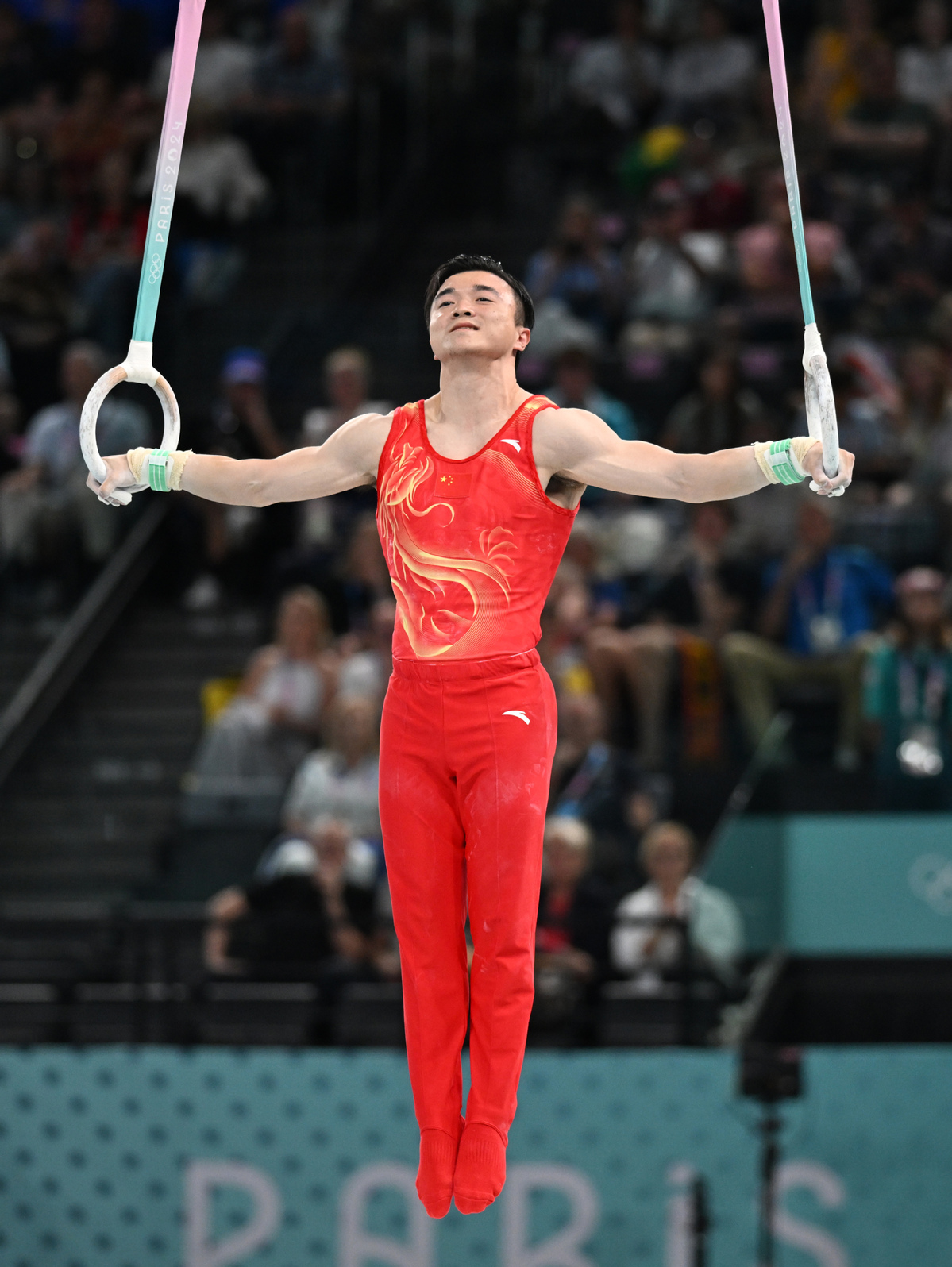

Along with records broken and medals celebrated, competing at the Olympics is more often littered with narrow defeats, last-gasp errors and mental meltdowns that build true character and sportsmanship.
After winning a groundbreaking women's singles gold at the Paris Olympics, Chinese tennis superstar Zheng Qinwen sat down for an exclusive interview with China Daily online show Tracking Success. Zheng said that she holds both fire and water in her heart in order to achieve victory on the court, as she needs passion, but also patience to handle tough situations. She also said that the Games brought out her best, as she fought not just for herself, but for the honor of her nation on the red clay in Paris. To learn more, click the video.

PARIS - Sweden's Armand Duplantis broke his own world record as he successfully defended his pole vault title at the Paris Olympics on Monday.
Duplantis cleared 6.25m with his third and final attempt to eclipse his previous mark of 6.24m set in April.
American Sam Kendricks took silver and Greece's Emmanouil Karalis claimed bronze.
"The party is going to be pretty big," the 24-year-old replied when asked what his plans were for the night ahead. "Not that much sleep, a lot of partying, a good time."
Duplantis, a two-time world champion who has broken the world record nine times, is the first man since American Bob Richards in 1952-1956 to win back-to-back Olympic pole vault titles.
He said the crowd had spurred him on as he sought to break his world record with the gold medal already guaranteed.
"I was just trying to channel the energy everybody was giving me, and they were giving me a lot of it. It worked out," he added.
Kendricks produced a season-best leap of 5.95m to finish ahead of Karalis and Ernest Obiena of the Philippines, who each cleared 5.90.

With one world record broken, three Olympic medals collected and plenty of respect earned, China's swimming prodigy Pan Zhanle celebrated his birthday by taking the Olympic pool by storm, and receiving another golden gift.
If there remained any doubts over his world-record-breaking performance in the 100m freestyle final, the "human thruster", as Pan has been nicknamed by Chinese fans, dispelled them all, as he helped the Chinese swimming squad cap its Paris 2024 campaign with a resounding victory in the men's 4x100m medley relay on Sunday.
Putting the Olympic icing on his 20th birthday cake, he eclipsed his own 46.40-second 100m world record with a rapid 45.92 final leg in Sunday's relay — a slap in the face of his detractors, proving what they claimed was "not humanly possible" is well within reach.
"We won, we are the winners. And if someone is not so happy about this, just let them be. We will leave proud of ourselves," Pan said after he propelled Team China, all the way from third place before his final leg, to win the medley relay in 3 min, 27.46 sec to rousing applause at the Paris La Defense Arena.
The United States finished second, 0.55 seconds behind China, while the host France, powered by four-time gold medalist Leon Marchand, had to settle for bronze, finishing in 3:28.38.
The inspiring win from the quartet of backstroke specialist Xu Jiayu, breaststroke world champion Qin Haiyang, butterfly speedster Sun Jiajun and Pan has ended Team USA's 64-year stranglehold on the men's medley relay at the Olympics.
With the exception of the 1980 Moscow Games, which the US boycotted, Team USA has won every race in the discipline since it was first introduced into the Olympic program in 1960 — until now.
Pan's scintillating final-leg push — the world's first sub-46 sec 100m split ever — also surpassed the 46.06 swum by Jason Lezak of the US that led the American team to gold in the event at Beijing 2008.
According to World Aquatics rules, only athletes competing in the leadoff leg in a relay are eligible to count official world record times, due to the following legs' advantage on faster relay dives compared to the static start in an individual race.
While the crowd was left stunned by his lighting-fast final leg, Pan, however, wasn't surprised at all.
"To crack the 46-second barrier was a goal I set on my birthday a year ago. I am just so happy that I realized it big-time — at the Olympics," said Pan, who also won a silver medal as a member of China's runner-up team in the mixed 4x100m medley relay.
Adding to the excitement on Sunday was the resurgence of breaststroke phenom Qin, who swam the field's fastest second leg — 57.98 — returning to his flying pace and keeping the team in pole position in the early stages of the relay.
As the first swimmer to sweep all three breaststroke titles (50m, 100m and 200m) at the world championships last year, Qin suffered a disappointing individual slump, missing out on a podium finish in both the 100m and 200m in Paris, which he attributed to the pressure-cooker atmosphere.
The current 200m breaststroke world record holder (2:05.48) said the relay gold is a critical morale booster for the Chinese swimming program, despite coming a bit late.
"This gold medal is of great significance to the entire Chinese swimming team. At these Olympics, we've experienced a lot of challenges, and we've come a long way. This achievement is the most inspiring of all. It showed the solidarity of our team," said Qin, who finished 7th in the 100m and failed to qualify for the 200m final in Paris.
"Our goal today was to win the gold and break the stranglehold of the US, and we've done it."

Showing their mettle
With two more bronzes bagged in women's 50m freestyle by Zhang Yufei and in the women's 4x100m medley relay in the final evening session, the Chinese swimming team wrapped up the nine-day Olympic meet with two gold, three silver and seven bronze medals to bring home its biggest medal haul from the Paris pool, with six more than Tokyo and two more than its previous best at London 2012.
The distraction from groundless accusations of doping leveled by overseas media, such as The New York Times and German broadcaster ARD, targeting Chinese athletes involved in a proven food contamination incident in 2021, took a heavy toll emotionally and psychologically on the nation's pre-Games favorites, including women's butterfly star Zhang and men's breaststroke world champion Qin.
Both Zhang and Qin struggled to bring their best form in their respective specialist events, having had to face a higher-than-normal number of doping tests prior to, and during, the Games, as well as fielding questions from overseas media that were both unfair and irrelevant to their performances.

"I feel proud of myself, but I am not so satisfied that the medals are all bronze and silver. I dreamed of a gold medal, but, this is sport. At this competition, it is not as simple as do your best and you get what you want," said Zhang, after clocking 24.20 to win a bronze medal in the women's 50m free on Sunday. "I accept this result, and I will never give up doing my best in the future."
"This is my third Olympic Games. I've had a whole life in swimming, so, after Paris, I maybe want to try a different experience. Maybe get a boyfriend or go to college, possibly go traveling. Then, if I still have the passion to come back and push for a fourth Olympics in 2028, I will," said Zhang, who won bronze in both the 100m and 200m individual butterfly finals.
The 26-year-old has pocketed a total of 10 medals at the past two Summer Games, giving her biggest collection of Olympic metalware of any Chinese athlete, across all sports.
The rise of the younger generation, led by women's 100m breaststroke silver medalist Tang Qianting and Pan, has helped the veterans rest assured that the program's future is in good hands.
"I am feeling quite proud of my younger teammates, who have shown obvious progress at these Games. I am not young anymore, but they have great potential to keep Chinese swimming competitive in the future," said Xu Jiayu, a three-time Olympian who won his second men's 100m backstroke silver medal in Paris.
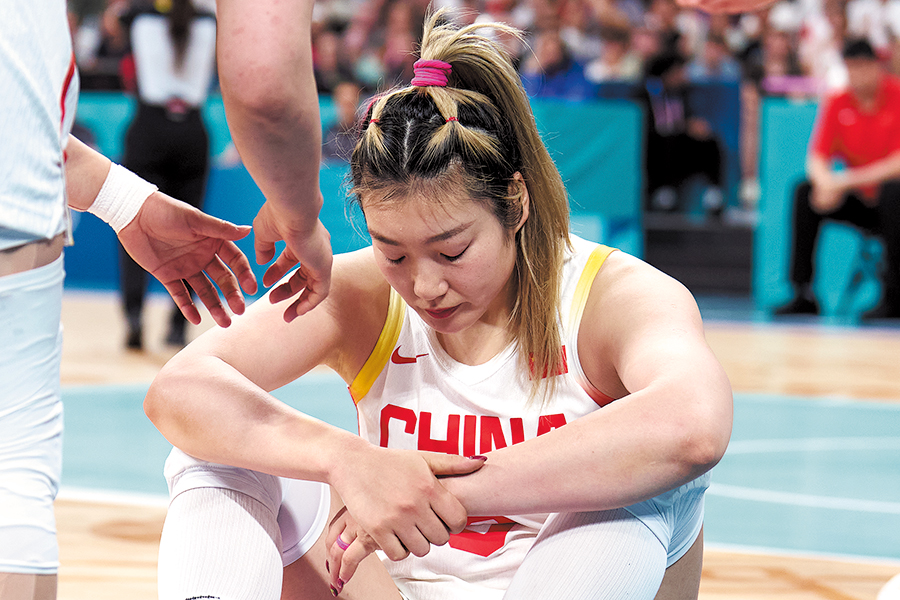
Relying on others to shape your destiny is not about luck, it signals a shortfall in strength. As the curtain fell on the women's basketball group stage at the Paris Olympics on Sunday night, the Chinese team narrowly missed out on advancing to the quarterfinals by a single point, bringing its Olympic journey to an unexpected halt.
Runner-up at the 2022 Women's Basketball World Cup, Team China entered the Olympics with aspirations of a podium finish. However, its campaign began with a heartbreaking 89-90 overtime loss to Spain, followed by a whopping 59-81 defeat to Serbia.
In Olympic women's basketball, teams compete in three groups, with the top two from each group, and the top two third-placed teams, advancing to the quarterfinals. Despite a commanding 80-58 victory over Puerto Rico in its final match, China's fate rested on the outcome of matches in other groups.
Australia's triumph over France secured it best third-placed spot, with two wins and one loss. Meanwhile, Belgium's resounding 27-point victory over Japan in its final group game edged it slightly ahead of China on net points, clinching the final quarterfinal berth — and signaling the end of China's bid for Olympic glory.
"We stood on the brink, knowing a single defeat could end it all. We fought with determination, treating each game as if it were our last," said Team China center Li Yueru after the win over Puerto Rico. Indeed, this match was China's last at the Paris Games.
In stark contrast to the disappointment of China's women's basketball team, the Chinese women's volleyball team, securing its Olympic berth just over a month ago, has surged to the top of its group. It clinched three consecutive victories, confidently, advancing to the quarterfinals where it is set to face Turkiye on Tuesday.
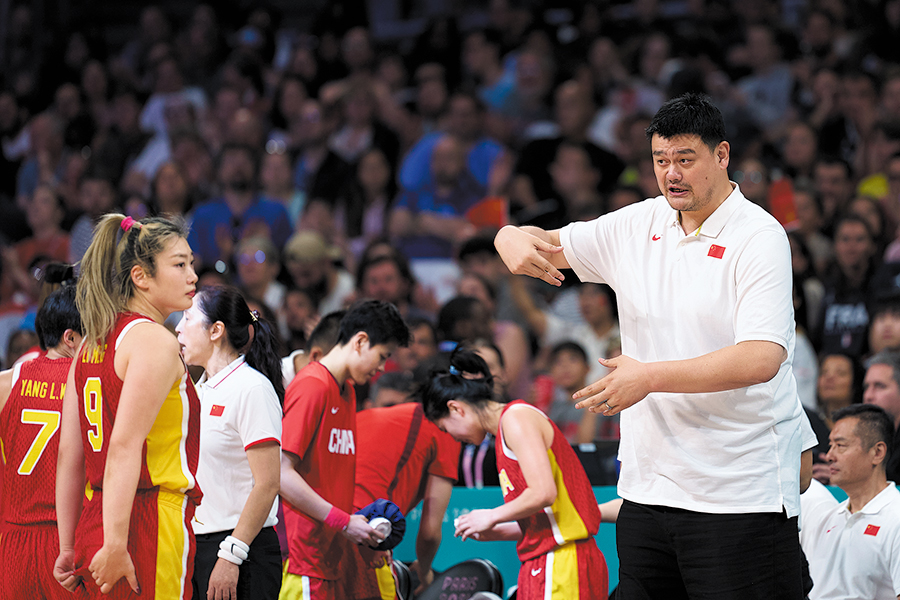
Some net gains
The impressive performance of the volleyball team has kept alive China's hopes of podium success in one of the three major "big ball "sports — basketball (5x5), volleyball and soccer — at the Paris Olympics.
Since the Tokyo Olympics, China has struggled.
The Chinese men's teams in all three sports failed to qualify for either Games. In Tokyo, the Chinese women's soccer team didn't advance past the group stage, finishing 10th, and didn't qualify for Paris at all.
The women's volleyball team, the defending champion in Tokyo, finished a disappointing ninth. The women's basketball team's fifth-place finish three years ago was the best result among the six teams.
In Paris, the Chinese women's basketball team finished ninth, its second-worst Olympic result ever, only better than its 10th-place finish in Rio 2016. It has reached the quarterfinals six times and the semifinals twice out of nine Olympic appearances.
The early exit, perhaps, wasn't a total surprise. In pre-Olympic warm-up matches, China had a poor record of two wins and 11 losses, struggling against strong teams like Australia, France and Belgium.
The women's sport is also grappling with a challenge similar to that faced by their male counterparts: the domestic league's low intensity is failing to maintain high performance levels. The lack of competitive drive and resilience needed for international play is evident in the team's results.
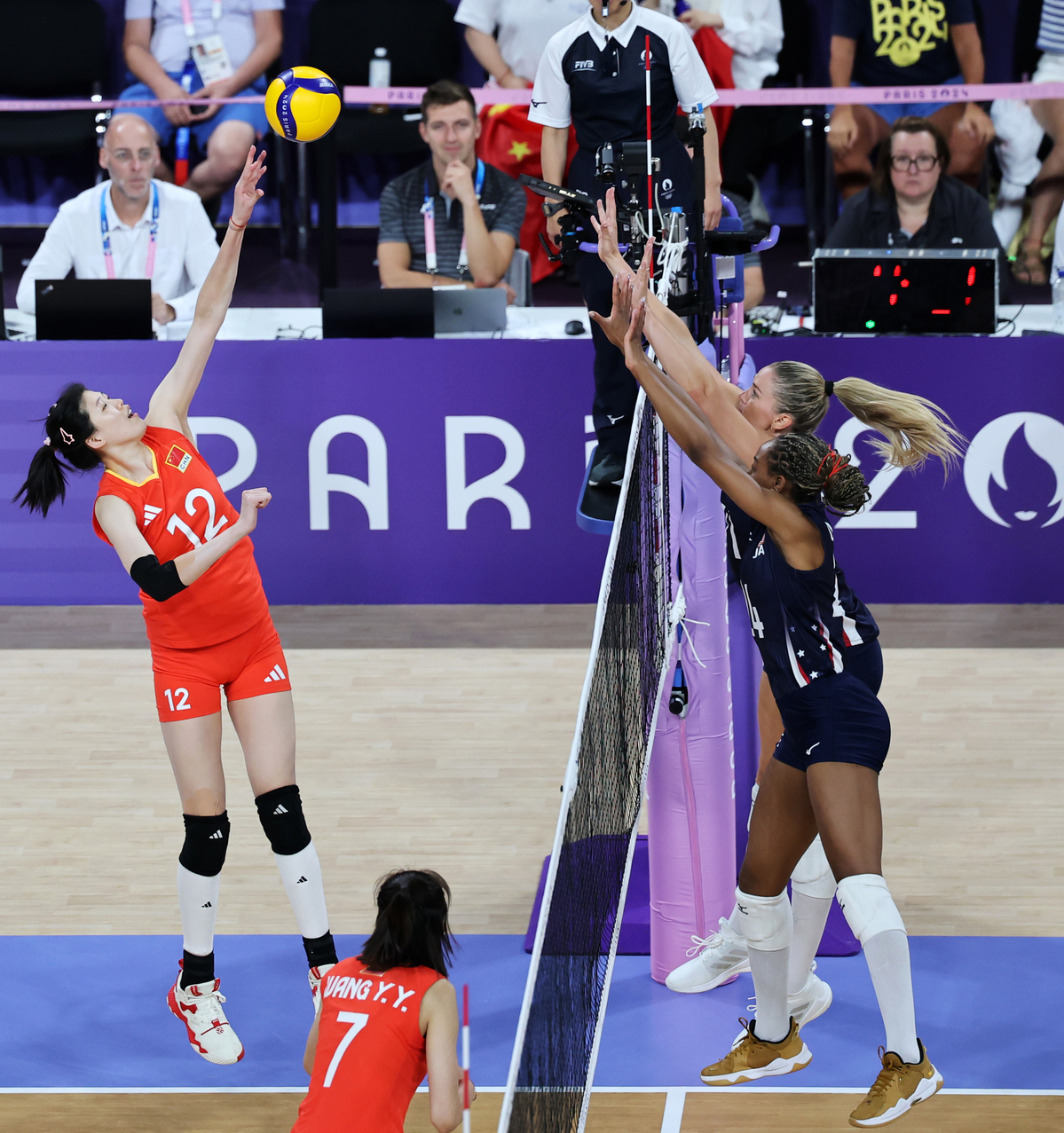
One potential solution is to gain experience by playing in higher-level leagues abroad. Li Yueru, a standout player for China in Paris, is a prime example. Having left the Chinese league for Turkiye, and then the WNBA's Los Angeles Sparks, Li has showcased the benefits of international-level competition.
In Paris, she has quickly demonstrated her enhanced skills, surpassing her previous Olympic averages of 7.4 points and 3.2 rebounds per game, by scoring 31 points and grabbing 15 rebounds in her first match.
Basketball commentator Su Qun recently highlighted on his WeChat account that Li's performance in the first game was like that of a female Shaquille O'Neal, reflecting her significant improvement from playing overseas.
"Li once told me she wanted to compete in a more challenging environment. In domestic leagues, it's mostly national team players facing each other," Su said. "This underscores the importance of stepping out of one's comfort zone."
Li's international experience serves as a model for players in other major team sports. While moving abroad involves adapting to new languages and environments, these challenges are essential for psychological and technical growth.
However, it's a bit of a "catch 22". To find such opportunities, a player has to be good enough, and to be good enough, they need to have a domestic set-up that allows them to excel.
However, the unique appeal of competitive sports lies in overcoming adversity. The stage is always set, and while the Chinese women's basketball team has experienced success, it will not fear the lows.
Next time, hopefully, the ball will be in their court.
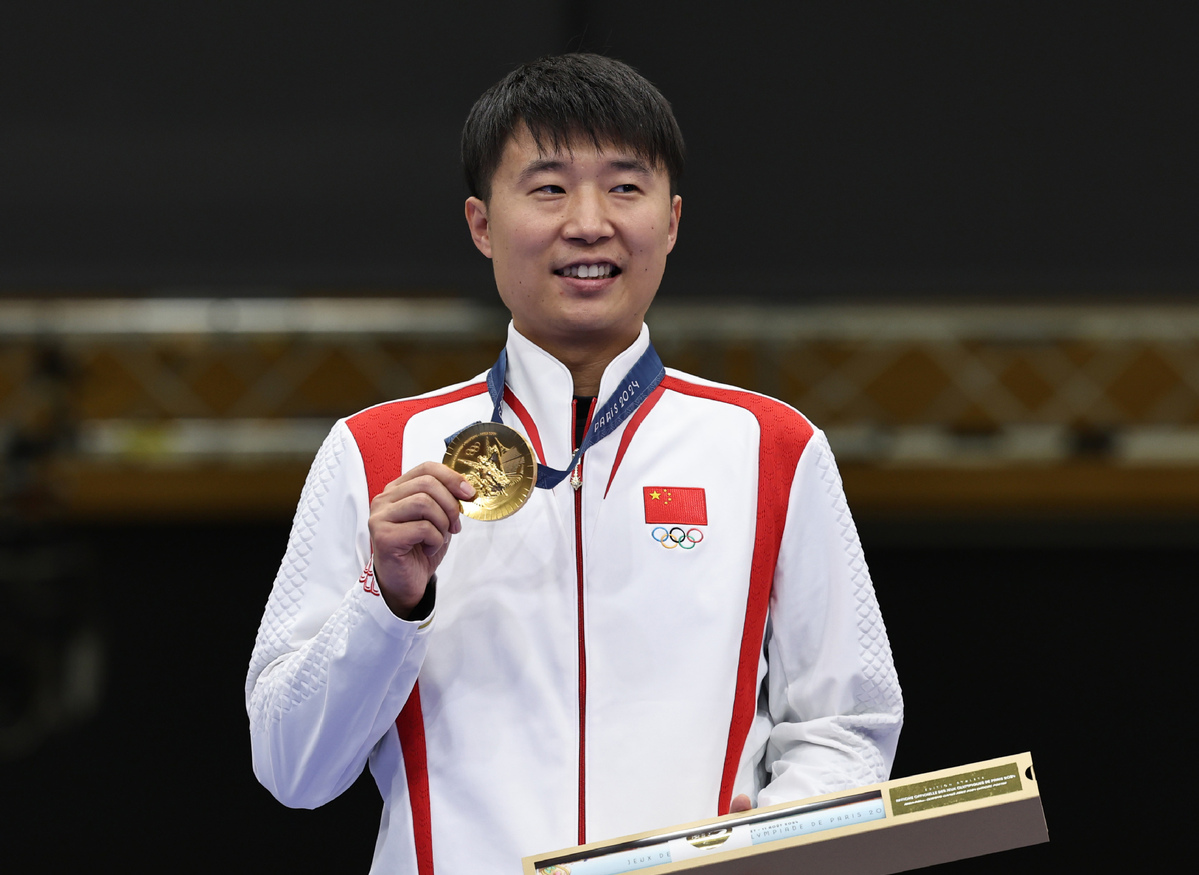
Seasoned shooter Li Yuehong cracked a hard target on Monday at the Chateauroux Shooting Centre, near Paris, France, to bring China its first-ever Olympic gold in the men's 25m rapid fire pistol event.
Cho Yeong-jae of South Korea won silver, and Li's teammate Wang Xinjie took home the bronze.
Li, 34, who has made three Olympic appearances and won bronze medals at Rio 2016 and Tokyo 2020, realized his golden dream with 32 hits at the ongoing Games. At the prize ceremony on Monday, Li triumphantly raised his arms, sharing the joy of his victory with the audiences.
His monumental achievement raised the number of gold medals won by the Chinese shooting team in Paris to five. The team's overall performance has been stellar, with a haul of 10 medals, including two silvers and three bronzes, making this the team's best Olympic show ever.
From the first gold secured by Generation Z members Huang Yuting and Sheng Lihao in the 10m air rifle mixed team event, to the fifth gold won by Li, who is the Chinese shooting team's eldest member, the champions demonstrated how talent spans generations in China.
Monday's final rounds were fiercely competitive, but even when he was trailing, Li — a world record holder — didn't lose hope, fighting until his very last shot. In the decisive final three rounds, he delivered two perfect sets of five hits and one set with four out of five, securing his lead and clinching the gold.
After his historic win, Li shared a long embrace with his coach, Zhang Jianwei.
"Our coordination is seamless. We understand each other with just a glance," Li said, expressing deep gratitude for the unwavering support and meticulous training he received from Zhang since they started collaborating in 2021.
Li's victory also filled the last gap in the Chinese shooting team's gold medal puzzle. Before the Paris Games, the men's 25m rapid fire pistol was the only event in which the Chinese team had not yet won an Olympic gold.
"I stand on the shoulders of giants, learning from my predecessors. They have won every championship except the Olympics. I carry their dreams with me," Li said, attributing this breakthrough to the hard work and dedication of generations of Chinese shooters. "This gold medal belongs to each and every one of them."
Li gained fame early in his career and secured many milestones. At the 2010 Asian Games, held in Guangzhou, Guangdong province, he was a newcomer to the national team and won two gold medals in the men's 25m rapid fire pistol individual and team events.
In August 2023, Li created a world record in the men's 25m rapid fire pistol event at the ISSF World Championships in Baku, Azerbaijan, with 39 hits, which he still holds.
However, his Olympic journey had been challenging until now.
Li recalled that during the Rio Games, he wasn't yet "capable enough" of winning gold and was "thrilled" with just bronze. During the Tokyo Games, although his skills had improved, his focus wavered and he came in third.
"In my first two Olympics, I couldn't consistently perform at a high level, so I mostly gained experience from (my) losses," he said. "After working with my new coach, I focused more on avoiding the mistakes I had made before. This time, I was in a much better shape. I thank myself for the years of perseverance, and I am deeply grateful to everyone on the team. We have all been striving toward (achieving) our dreams."
Veteran shooter Tao Lu'na, who claimed the first gold medal for China at the 2000 Sydney Olympics in the women's 10m air pistol event, has been watching the Chinese shooting team's performance at the Paris Games.
"Success is not accidental, but comes from long-term, relentless effort. I am incredibly proud of our Chinese shooting team," Tao told The Paper.
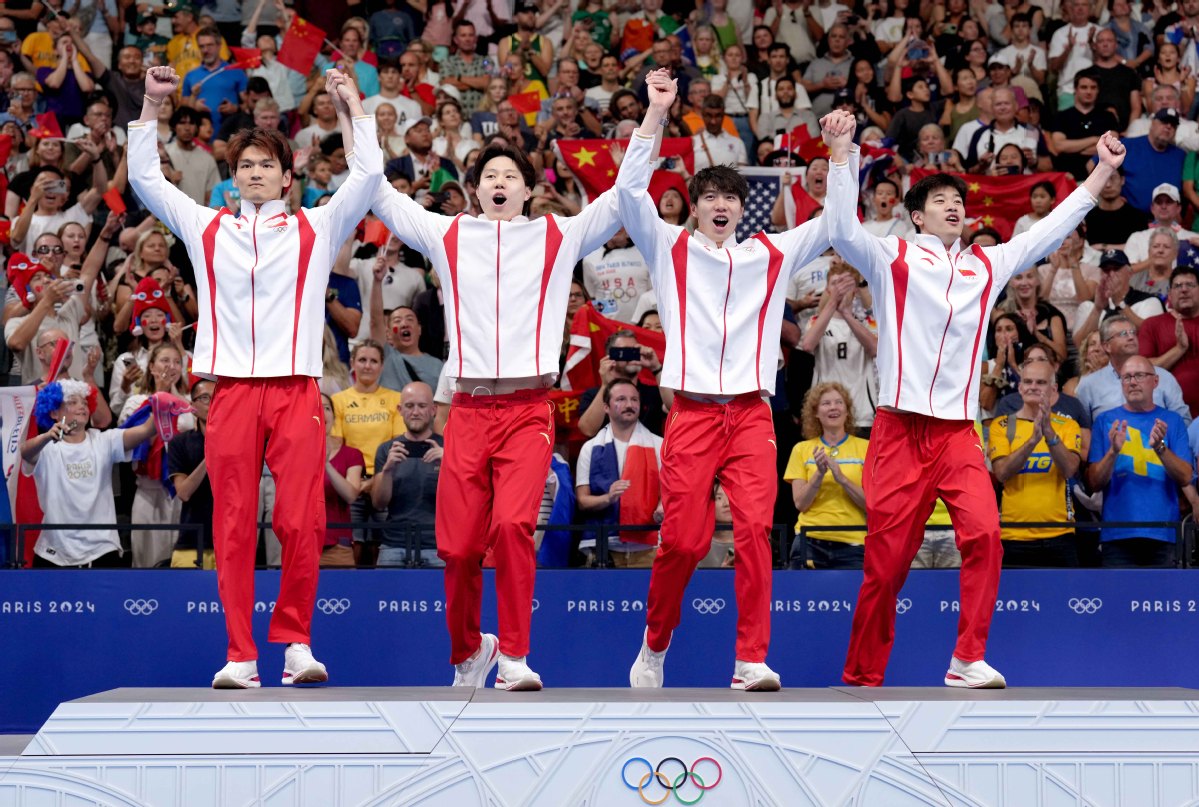
Despite a slow start affected by unfair anti-doping scrutiny, Chinese swimmers have capped their Olympic campaign with pride, bringing home the biggest medal haul ever, one new world record and plenty of respect from the Paris pool.
After nine days of intense competition, the Chinese swimming team wrapped up its Olympic program with a strong finish by pulling off an inspiring victory in the men's 4x100m medley relay, ahead of the United States and France, to add a second gold to its total of 12 medals. The team surpasses its previous best of 10, achieved at London 2012.
Propelled by 100m freestyle gold medalist and world record holder Pan Zhanle, the Chinese quartet, also including backstroke veteran Xu Jiayu, breaststroke world champion Qin Haiyang and butterfly specialist Sun Jiajun, came from behind, riding on Pan's scintillating pace in the final split to touch first in 3 minutes, 27.46 seconds in the heated final. The exciting finish at the Paris La Defense Arena brought the applauding capacity crowd to its feet.
The victory ended the US team's decadeslong stranglehold on the medley relay in the Olympics, where they have won every time — except at the 1980 Moscow Games, which they boycotted — since the event was introduced in 1960.
During the medal ceremony, members of the once invincible US team, such as Caeleb Dressel and Ryan Murphy, greeted the Chinese team and shook hands with Pan and his teammates, before sitting down with the French squad for a group photo with the Chinese winners standing in the middle of the podium.
The mutual respect and appreciation helped ease the tension between Chinese swimmers and some of their foreign opponents that stemmed from false doping accusations by overseas media, such as The New York Times and German broadcaster ARD, that targeted Chinese athletes involved in what was proved to be a food contamination incident in 2021.
The sensationalized reports, although denied by the World Anti-Doping Agency and World Aquatics, the international governing body for six aquatic disciplines, led to more frequent than normal doping tests for Chinese swimmers before and during the Games. This took a heavy toll, emotionally and psychologically, on pre-Games favorites including Zhang Yufei in the women's butterfly and Qin in the men's breaststroke events.
However, Team China rose to the challenge and delivered when it mattered most.
Regarding the rigorous testing program that Team China endured in Paris, backstroke star Xu said: "We have no problem with that. We follow the rules. I don't want to make any excuses. We did overcome some challenges. We never shy away from challenges. This is something that is rooted in our Chinese spirit."
After winning the men's 100m freestyle in a world record time of 46.40 seconds on Wednesday, Pan backed it up with an epic 100m split in 45.92, the world's first sub-46 100m split, in his relay leg to push China ahead in the final sprint. That mark broke the previous fastest 46.06 effort by Jason Lezak of the US that led his team to gold in the same medley relay at Beijing 2008.
According to international rules, only the time of a leadoff leg in a relay event counts for official world records.
"I'm very proud of this achievement we had," said Xu, a three-time Olympian who won his second Olympic silver medal in the men's 100m backstroke in Paris.
Xu's longtime rival Murphy, a two-time individual backstroke Olympic champion, paid respect to his Chinese opponents, stressing that it is healthy for the sport to have more balanced competition.
"Today, China was just a little bit better," Murphy said. "It is hard to get separation in that race. It was really tight all the way through. Hats off to China, they had a great race tonight."
Dressel, a nine-time Olympic gold medalist on the US relay team, said the Chinese quartet deserved the win.
"Australia and the US, I feel, are the two most recognizable, but from these Games I saw it from China and France. I don't think we're getting any worse; it's good for the sport to have the whole world involved," he said.

The team technical routine of the artistic swimming competition at the Paris Olympics concluded on Monday. With a score of 313.5538, Team China ranked first among all the participating teams in the event. The team competition will continue with free routine and acrobatic routine in the coming days.
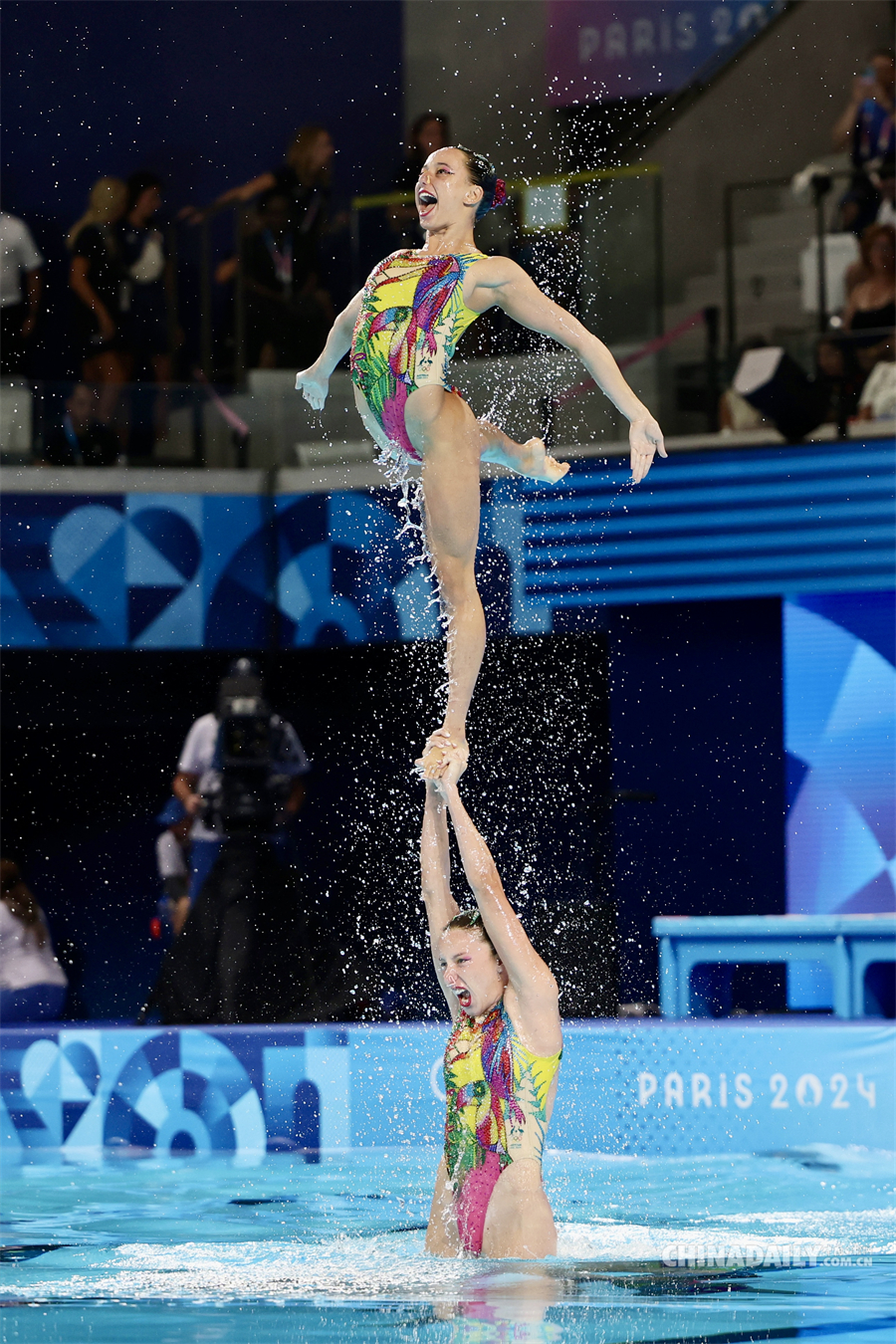



China's discus thrower Feng Bin matched the best ever performance by a Chinese discus thrower in the Olympic Games as she won her first Olympic medal, a silver, at the third time of asking in Paris on Monday night.
Feng, the 2022 world championship winner, had finished outside the medals in her two previous Olympic appearances and came into this year's top-12 final as the third-best qualifier.
She delivered six consistent throws, without any failed attempts, and her third, of 67.51 meters, was her best, but it was not enough to dethrone defending champion Valarie Allman of the United States, who won with a distance of 69.50 meters on her fourth attempt.
Feng had to settle with a silver ahead of Croatia's Sandra Elkasevic in third. She equaled Feng's best throw in her own third attempt, but was edged out for the silver medal because of her shorter second-best throw.
In the final, each athlete has six throws, and in the event of a tie, the second-best throw determines who finishes ahead.
Feng's predecessor Li Yanfeng, now retired, won China's first Olympic medal, also silver, in the event at London 2012.
Feng has been trying to throw beyond her personal best of 69.12 meters, achieved with her winning throw at the 2022 World Championships.
Her season's best this year is her winning throw of 67.89 meters at the World Athletics Diamond League competition in Norway in May.
A silver as her first Olympic medal was a big motivation, but far from satisfaction, Feng said.
"The distance was so-so, but to win my first Olympic medal is something I'm very happy about. I expected to throw about 68 meters to 69 meters," she said after the final.
"I lost a bit of sleep last night. Still some nerves. I probably rate myself 80 out of 100. The remaining 20 points, I lost it by not being able to get myself to the top.
"But I kept my promise before the Olympic Games that I would win a medal."
Looking forward, Feng said she is still focused on her goal of surpassing the 70-meter mark at a future major meet.
"It's still a target for me. I still want to go for that. I think I have the ability, I have the confidence," said the 30-year-old native of Shandong province.
"That's something I hope I can improve and achieve in the next four-year cycle. I still hope to maintain my level of throwing 68m, 69m consistently, and then I will aim to break the 70m mark."
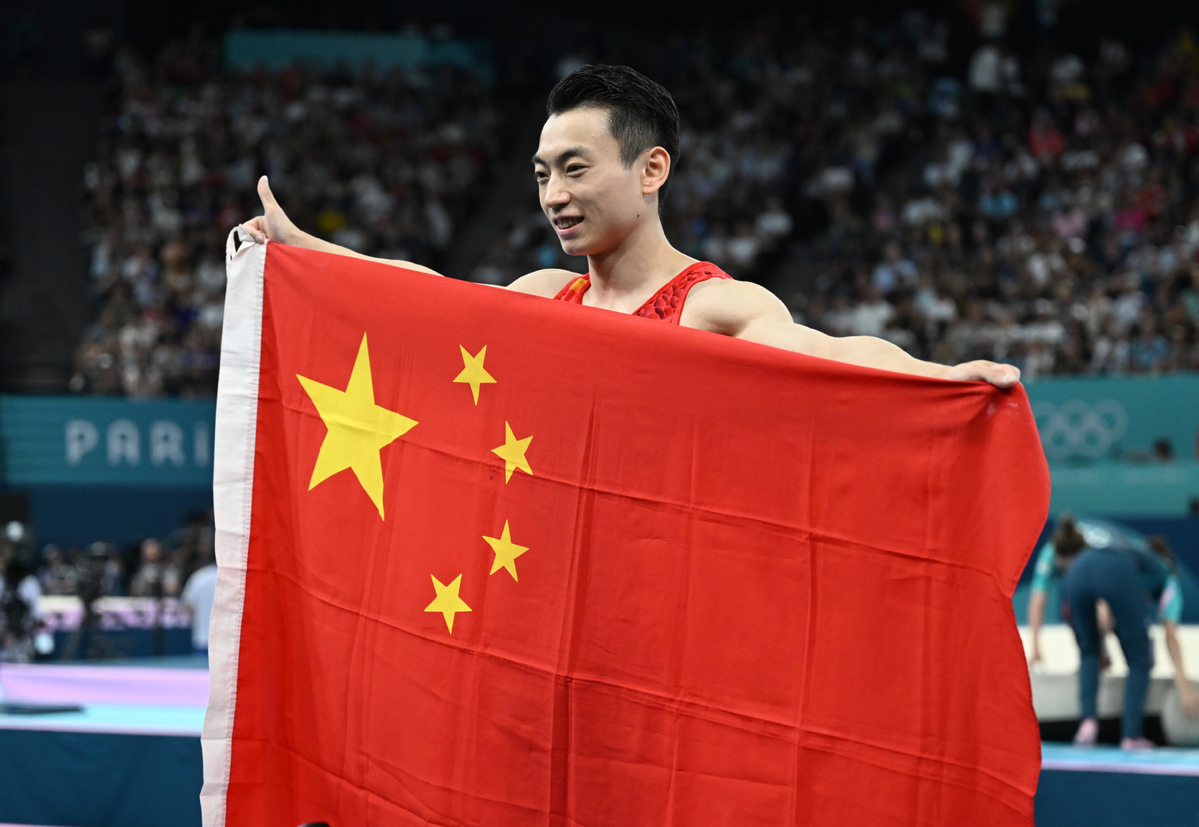
PARIS -- Zou Jingyuan overcame a shoulder injury to capture the men's parallel bars title on Monday for China's second gymnastics gold medal at Paris Olympics.
Defending champion Zou was only the third man to win two gold medals in a row on this apparatus, amassing a massive 16.200 points to edge Illia Kovtun of Ukraine, who took the silver with 15.500.
Shinnosuke Oka of Japan, the all-around champion, got the bronze with 15.300 points.
Zou was seen nursing his right shoulder after Sunday's rings final, in which he collected a silver. He said afterwards the injury affected his training.
Zou's near perfect routine drew gasps from the crowd at Bercy Arena. He was in perfect control and flied over bars with such smooth connections.
His compatriot Zhang Boheng who just won the silver of men's all-round finished fourth in Monday's competition.
Speculation mounts in international media circles that China is poised to reshape Olympic records by leading the gold medal count at the ongoing 2024 Paris Olympics.
With only one week left for the Games, China asserts its dominance by clinching 21 gold medals on Monday, outshining traditional powerhouses like the US.
After record-breaking performances in swimming and tennis, and strong triumphs in diving, shooting, and table tennis events, China gained 15 gold medals last week. China last topped the gold medal table at the 2008 Beijing Olympics.

According to the Newsweek, a weekly news magazine based in New York City, "China has a chance to make history as the only modern country, apart from the United States, to top the gold medal table without the advantage of competing on its home soil" in the Paris Olympics.
The Times of India said, "The Chinese athletes have demonstrated their exceptional skills across various sports, solidifying their position at the top of the medal tally."
Throughout the events in Paris, China exuded dominance on the diving board and shooting range, as nine of 19 total gold medals were gained.
"They were pretty much flawless, which was amazing," Thomas Daley of Great Britain told NPR on Monday after taking silver behind Chinese divers, Lian Junjie and Yang Hao, in the men's synchronized 10-meter platform final.
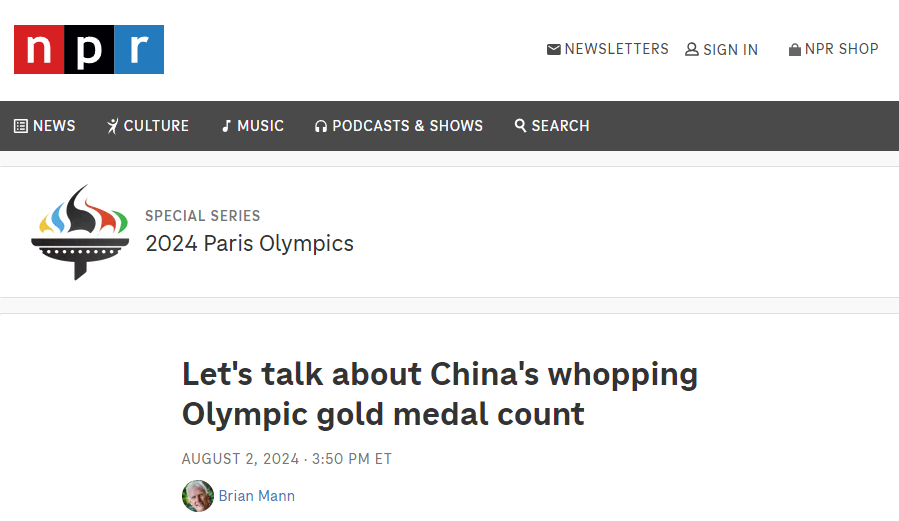
China has made giant strides in the Summer Olympics since winning just five gold medals in 1988. By 2008, when Beijing hosted the Summer Games for the first time, China won 48 gold medals and topped the table.
According to the International Olympic Committee, China has won a total of 263 gold medals in the 10 Summer Olympics from 1984 to 2021, ranking fourth after the US, the USSR, and the UK.
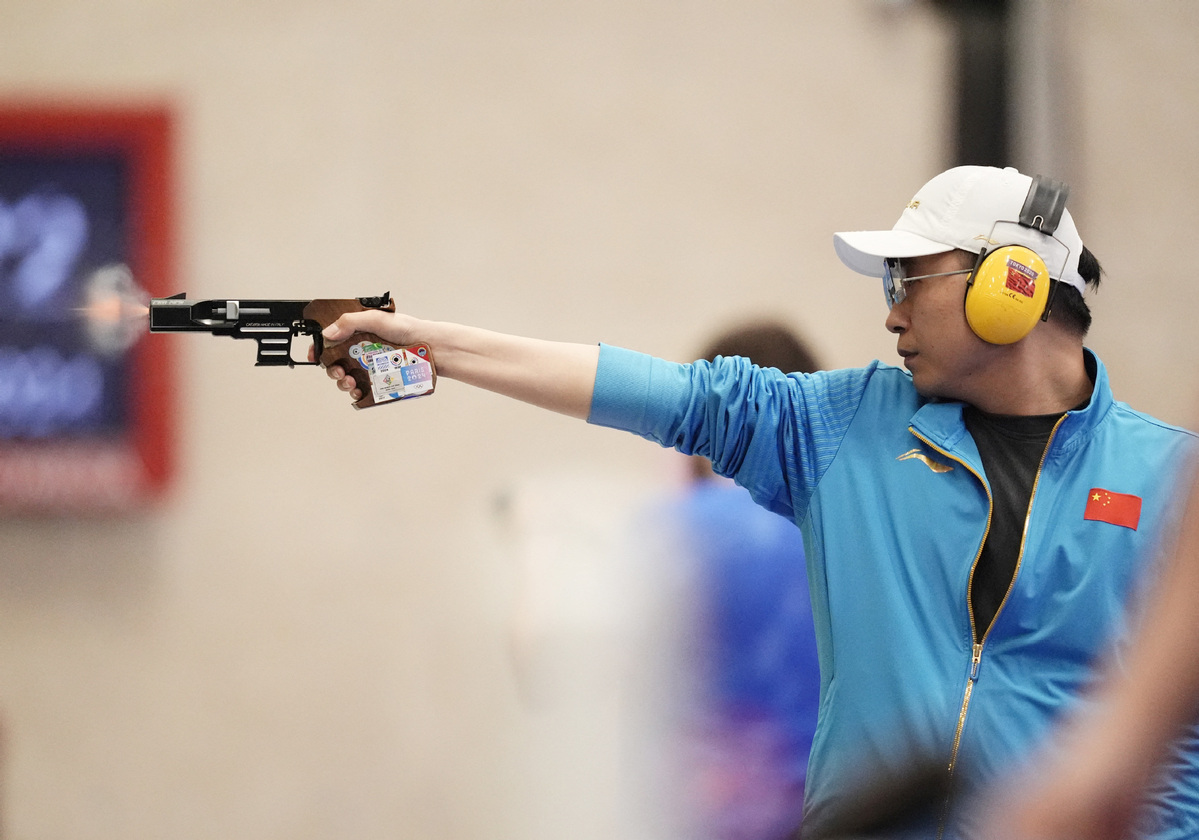
CHATEAUROUX, France - China's veteran shooter Li Yuehong won his maiden gold at his third Olympics after victory in men's 25m rapid fire pistol here on Monday.
The 34-year-old made 32 hits in the final to secure the fifth shooting gold for powerhouse China.
Li won bronze at both Rio de Janeiro and Tokyo Olympics.

China ended the United States' 64-year unbeaten run in the men's 4x100 meters swimming medley at the Paris Olympics on Sunday.
Amid deafening cheers at La Defense Arena, a converted rugby stadium, the 100-meter freestyle world-record holder Pan Zhanle led his teammates Xu Jiayu, Qin Haiyang and Sun Jiajun to victory as they recorded a time of 3 minutes, 27.46 seconds.
On Wednesday, Pan's time of 45.92 in the freestyle was one of the fastest 100m freestyle splits in history.
"This is magic for me," Pan, who celebrated his 20th birthday on Sunday, said of the medley victory. "We make a good team and we managed to get a great result."
The United States took the silver, 0.55 seconds behind China, while France, powered by Leon Marchand, won the bronze, finishing nearly a second behind.
"Today China was just a little bit better. I think all of us going in, we're putting a lot of pressure on ourselves to be great out there. ... So hats off to China, they did a great race tonight," Ryan Murphy of the US team told reporters.
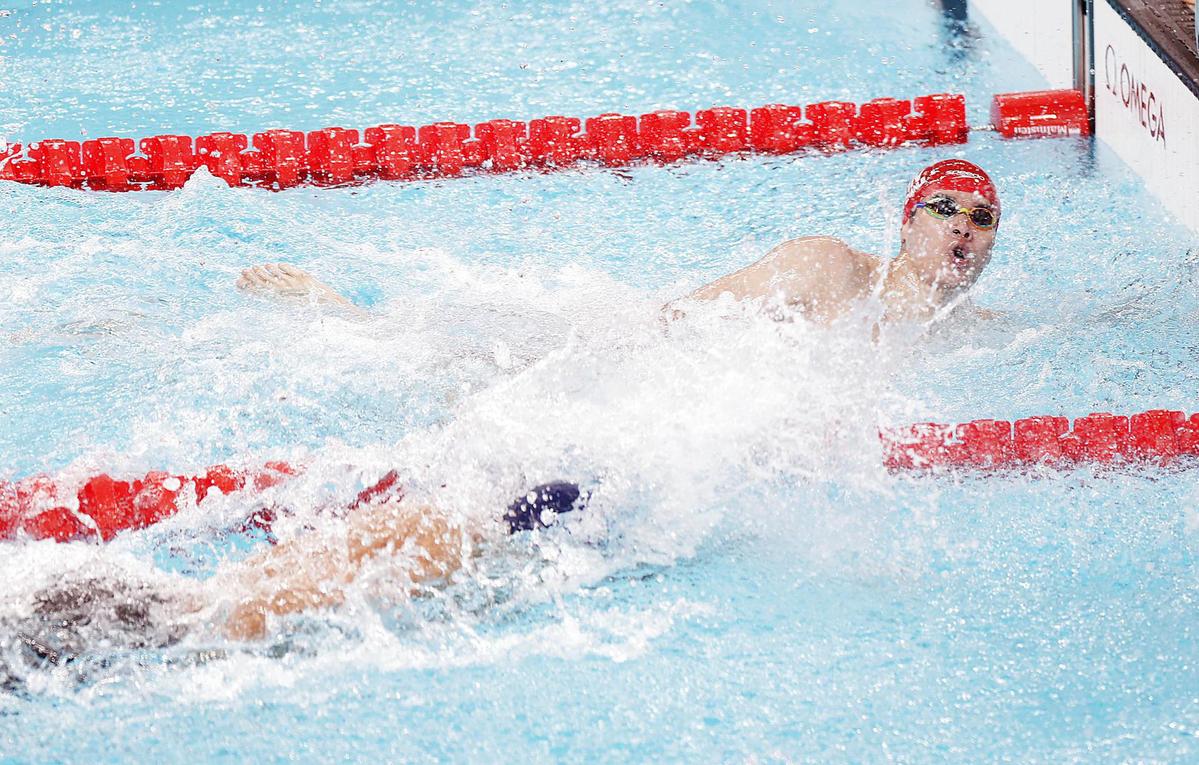
The Americans did not compete at the 1980 Moscow Games due to a boycott, but they had never been beaten in the men's medley final dating to the inaugural event at the 1960 Rome Games.
"That was a monster split for Pan ... so that's a pretty cool birthday present," said Hunter Armstrong of the US.
Qin, who swam the breaststroke leg in the medley, was also crucial in the victory with a time of 57.98 to beat France's four-gold medal winner Marchand.
Chinese swimmers had been unfairly portrayed in Western media reports about some food-contamination cases, raising doubts over their capabilities. Pan's success came as a timely, powerful response.
Acknowledging that he had been under tremendous pressure, Pan said that he had slept little before the final because of a doping test that ran into the early hours of the morning.
According to World Aquatics, swimming's global governing body, Chinese swimmers were tested on average 21 times from Jan 1 to the start of the Games. In comparison, Australian and American swimmers were tested only four and six times on average, respectively.
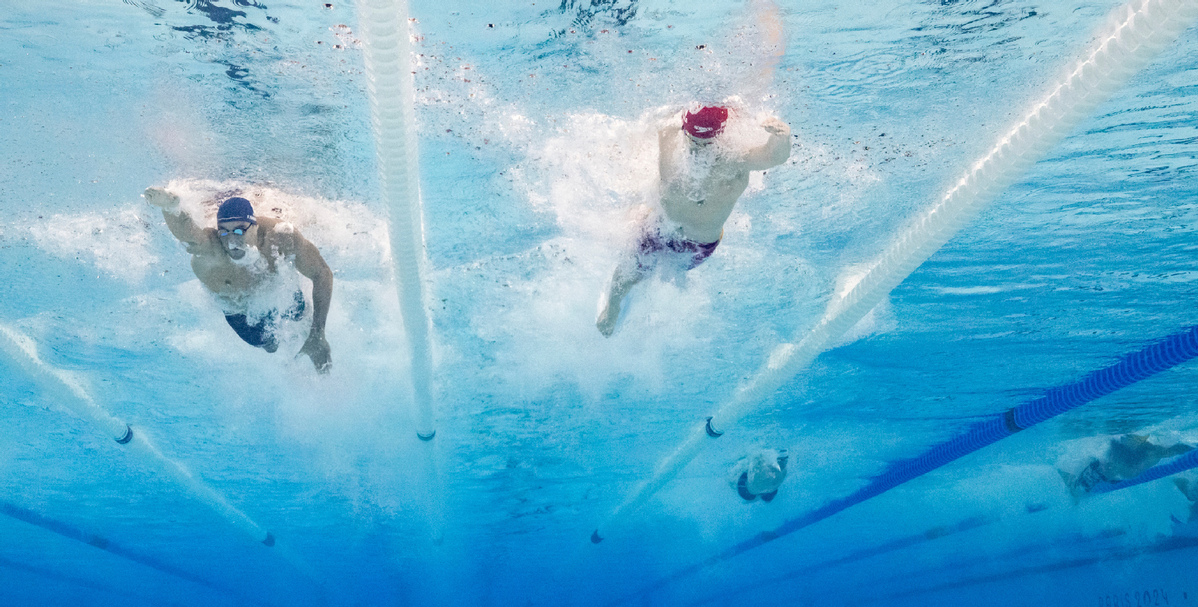
Under such circumstances, Chinese swimmers showed their resilience with a collection of two gold, three silver and seven bronze medals.
Although the US topped the swimming total with eight gold medals, the results were under par for the country since the 1992 Olympics.
The Americans had trailed Australia until the last day of swimming Sunday, when they secured two more gold medals in the men's 1500m freestyle and women's 4x100m medley relay, improving on world records in both events.
Bobby Finke of the US set a world record in the 1,500-meter freestyle, finishing in 14 minutes, 30.67 seconds to break the record of 14:31.02 set by Sun Yang of China at the 2012 London Games.
Legendary US swimmer Katie Ledecky last week won both the women's 800m and 1500m freestyle, raising her Olympic gold medal total to nine. She has won the 800m freestyle four times in a row, a feat achieved only by the US' Michael Phelps from 2004 to 2016.
Agencies contributed to this story.
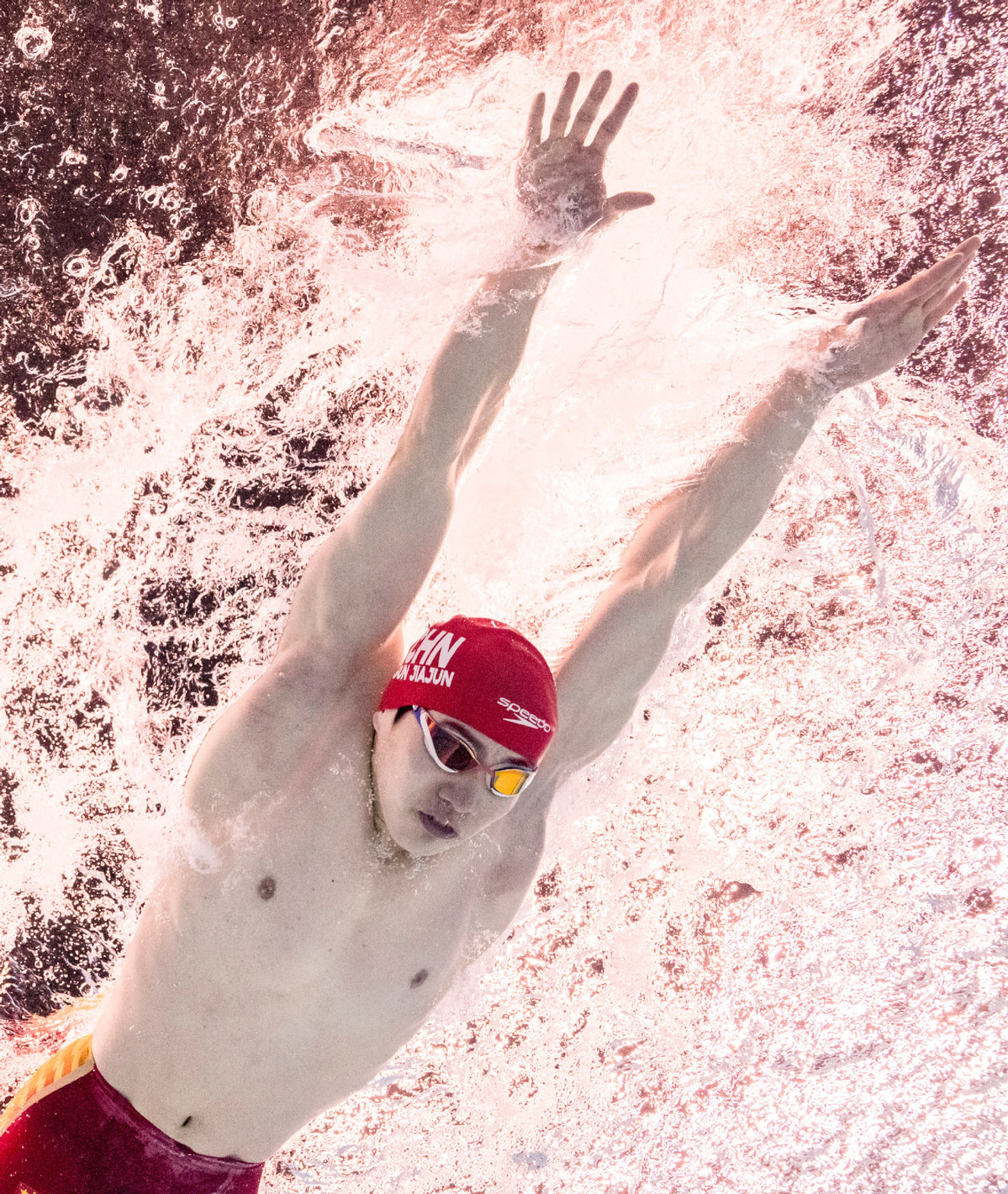
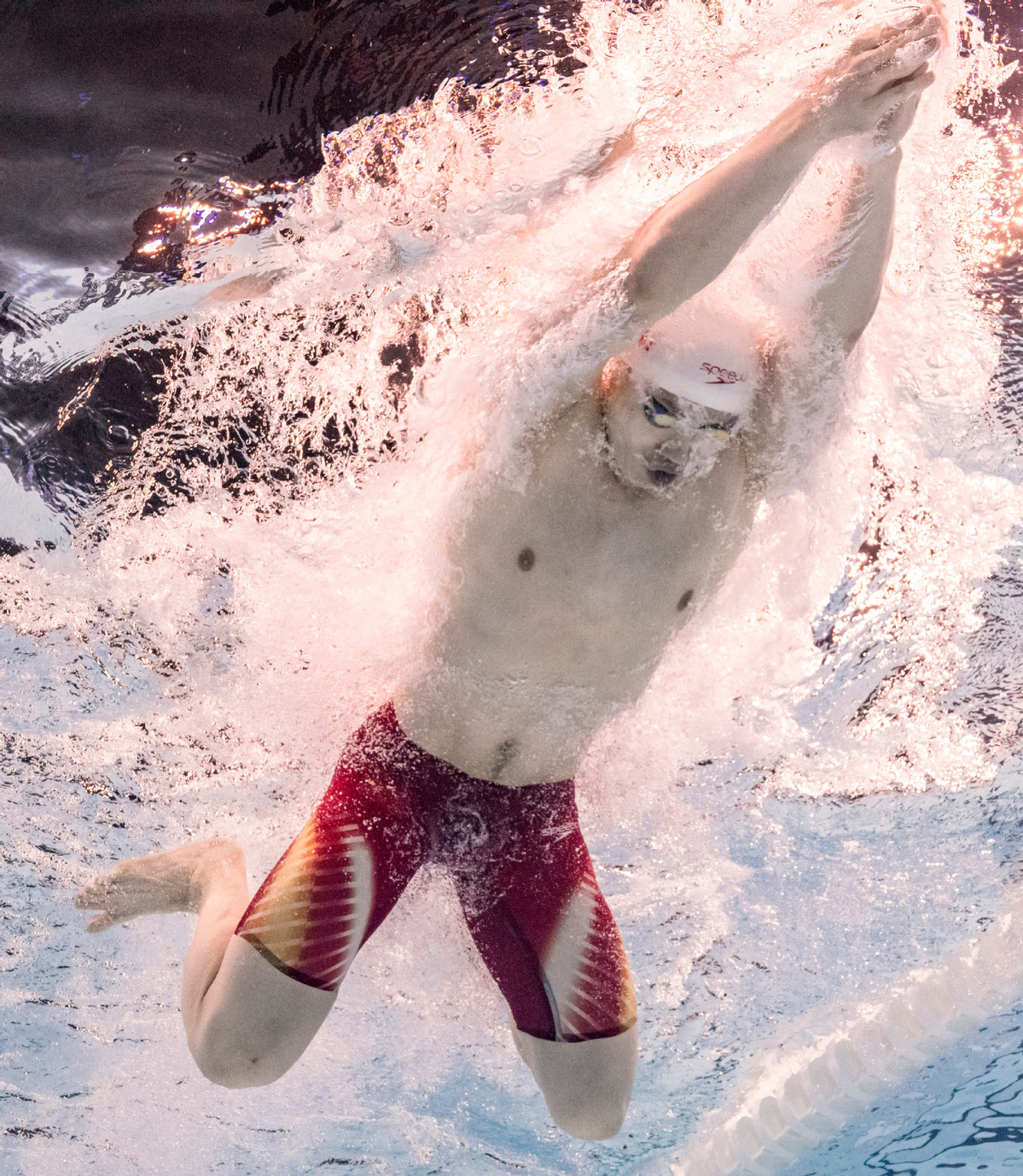
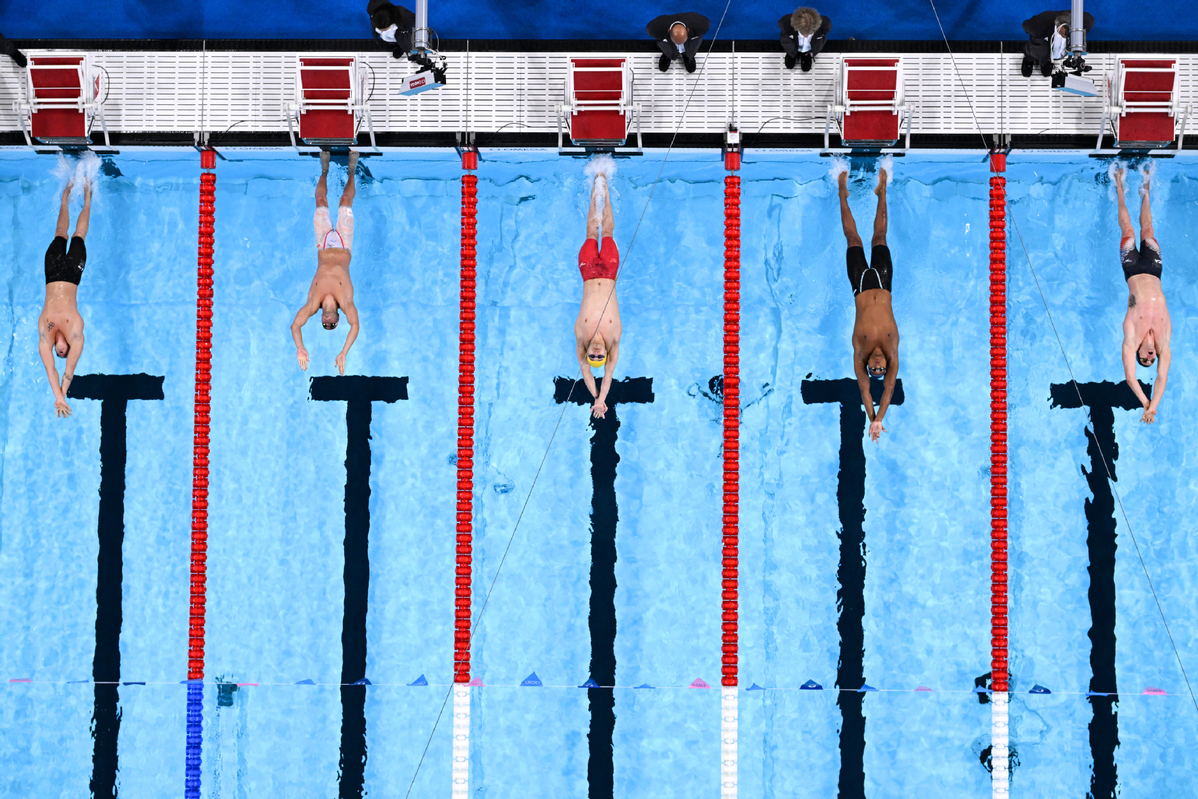
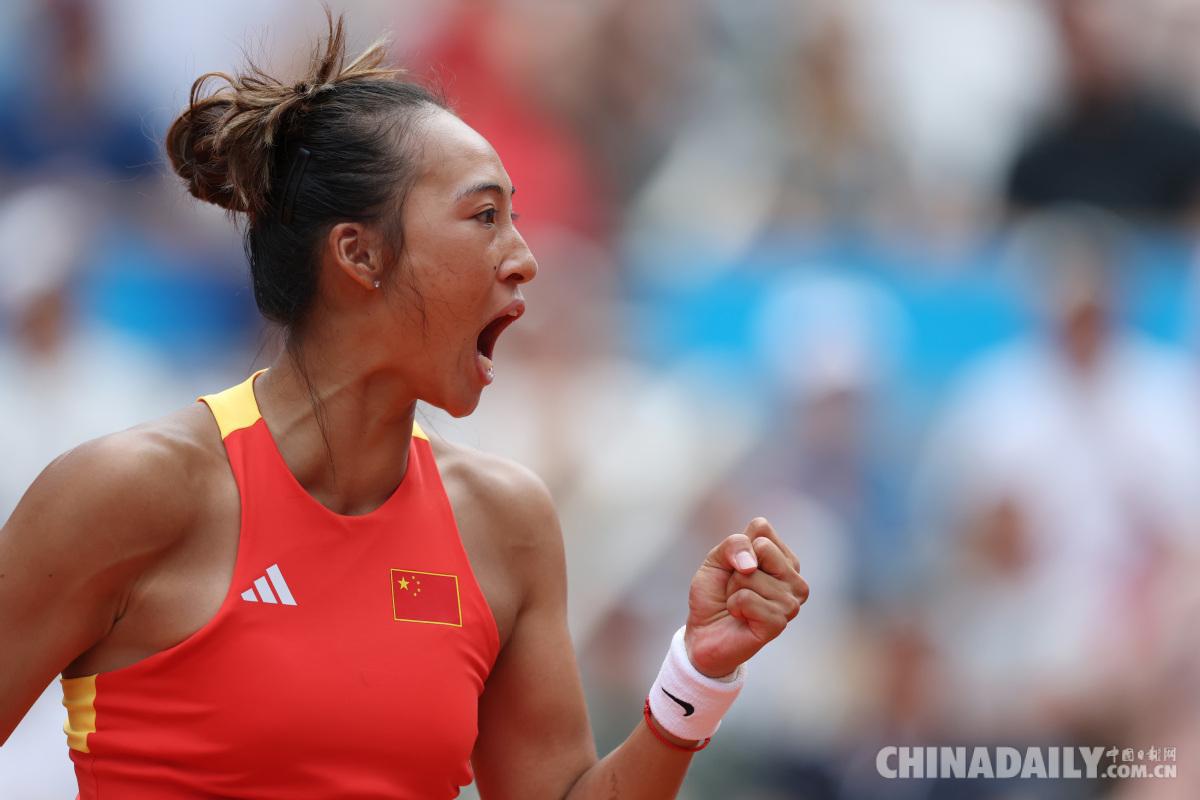
The red flag flew high, the national anthem rang loud and a champion lay sprawled on red clay, rejoicing in her unprecedented accomplishment — it all had a sense of deja vu for Chinese fans, transporting them back to 13 years ago at Court Philippe-Chatrier.
Yet, this time around, on Saturday afternoon, Zheng celebrated an even more special, emotional and "improbable" title than tennis legend Li Na's 2011 French Open win — the first Olympic singles gold medal ever won by a Chinese — or any Asian — player.
This monumental victory will undoubtedly pour even more fuel on the fire powering Zheng's meteoric career rise — it has already, surely, propelled her into the pantheon of Chinese sporting greats — but, more significantly, it will have served up another huge boost to the sport's momentum in China.
It was on the Olympic stage 20 years ago that another unprecedented tennis victory, the doubles gold medal won by Li Ting and Sun Tiantian in Athens, lit the spark, bringing the Western-dominated racket sport into China's mainstream.
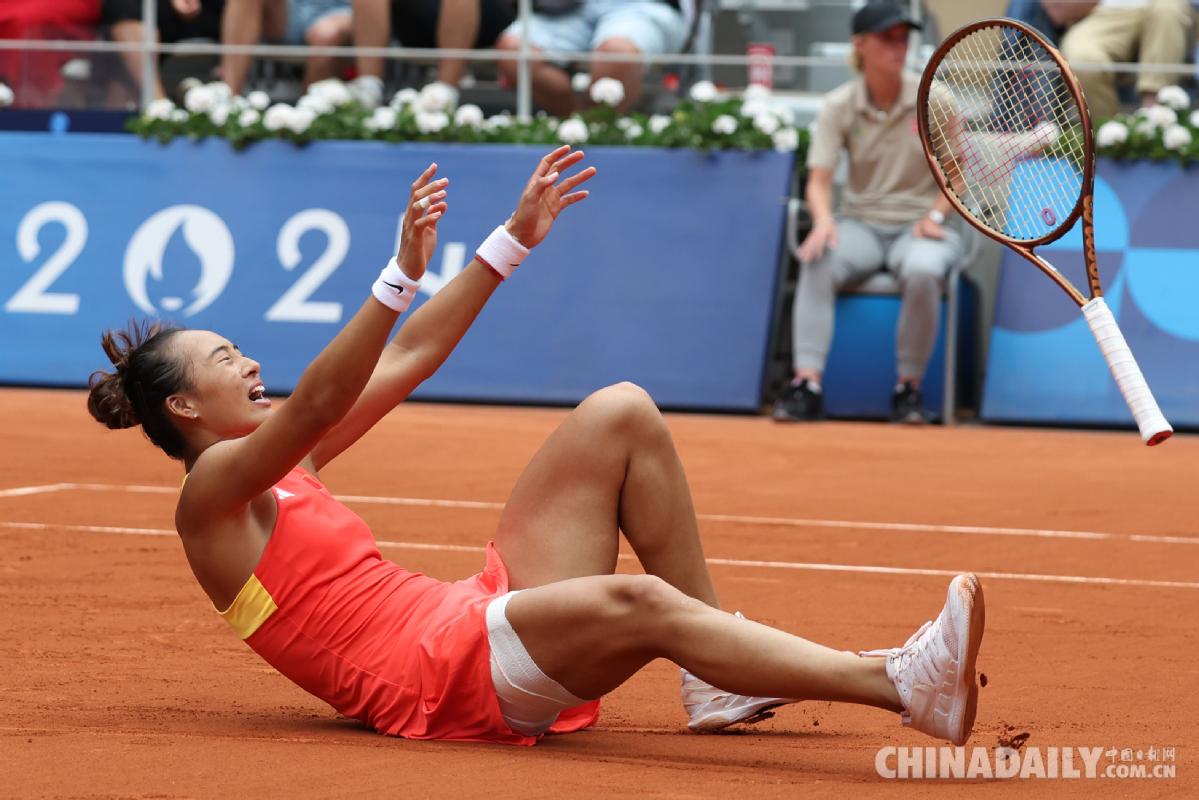
Li Na then gave it a major push by winning Asia's first Grand Slam singles title at Roland Garros in 2011, followed by a second trophy at the 2014 Australian Open.
Growing up admiring her predecessors, and dreaming big herself, Zheng has now etched her name in the sport's history alongside her heroes, and has most likely planted those same seeds of determination in the hearts and dreams, of the next generation.
"I am really excited and proud to join all the history-makers and to become a source of inspiration for the next generation," Zheng, a 21-year-old native of Hubei province, said in English after beating Croatia's Donna Vekic in straight sets in the gold medal match at Roland Garros on Saturday.
"I still have a long road ahead of me, because winning a Grand Slam is also one of my targets. Every era has a hero. Li Na led her generation. Now, I'll do what I can to reach my full potential."
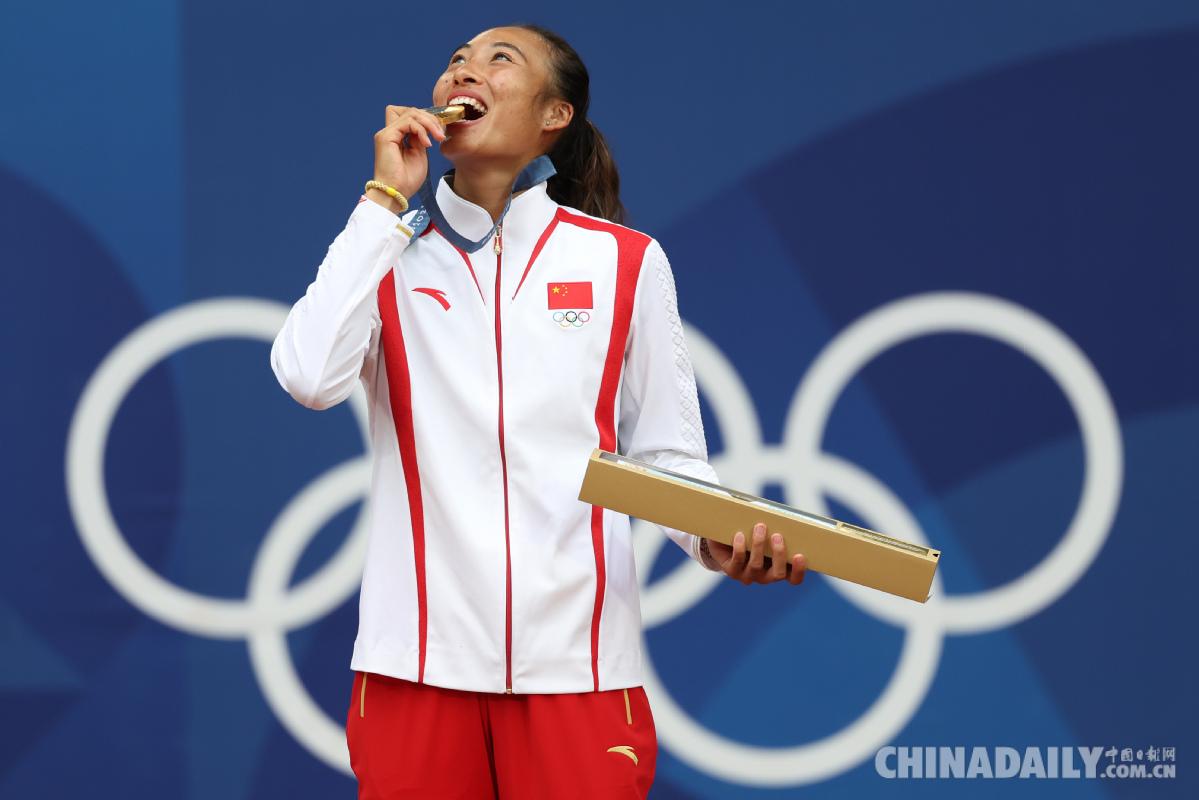
With her most-coveted Paris souvenir hanging around her neck, Zheng, who started playing tennis at 6 years old, influenced by her father, ranks the Olympic gold at the top of her career accolades, which include three singles titles on the professional WTA Tour, a runner-up finish at the 2024 Australian Open and a singles win at last year's Asian Games.
Even with no ranking points on offer, nor prize money awarded, the Olympic gold will always hold a special place in her heart, and will inspire her to attain further success on the pro circuit, Zheng said.
"My father always treats the Olympic Games more importantly than any of the Slams, myself as well. You can see it in my eyes; the hunger I had this week was different than in all the other tournaments I play," said Zheng, who, at No 7 in the world, is currently China's highest-ranked female player.
"Winning this Olympic gold medal makes me feel more relaxed, because finally I can tell my father 'I am an Olympic champion now'. It feels like a big stone has been lifted from my heart. Now I can enjoy tennis more, be more relaxed and have more fun on court."
Tougher than expected
Entering the Olympic tournament as the No 6 seed, Zheng has completed a physically demanding week of six matches, five of which were competed back-to-back.
She had to come back from behind in two consecutive three-hour matches to beat 15th-ranked Emma Navarro of the United States in the round of 16 and former world No 1 Angelique Kerber of Germany in the quarterfinals, before challenging reigning world No 1, Poland's Iga Swiatek, a four-time major winner at Roland Garros, in the semifinals.
Exhausted and under pressure, Zheng drew extra strength from her national pride to upset the competition favorite Swiatek in straight sets, claiming her first win in their seventh encounter and snapping the Polish star's 25-match winning streak on the "terre battue" of Paris.
"I had a lot of tough fights. In a lot of matches, I almost lost. But, there's a spirit holding me up. I don't know why, because in a usual match (on the tour), maybe I'd let it get away. At the Olympics, I just held it and kept fighting," said Zheng, who was eliminated in the third round of this year's French Open at the same venue in June.
"I'd been through five matches already, and my body hurt everywhere, but I still felt I had a lot of strength in me. If I needed to stay three more hours to fight through (Vekic), I felt I could do it for my country. I think the biggest achievement was my mental strength."
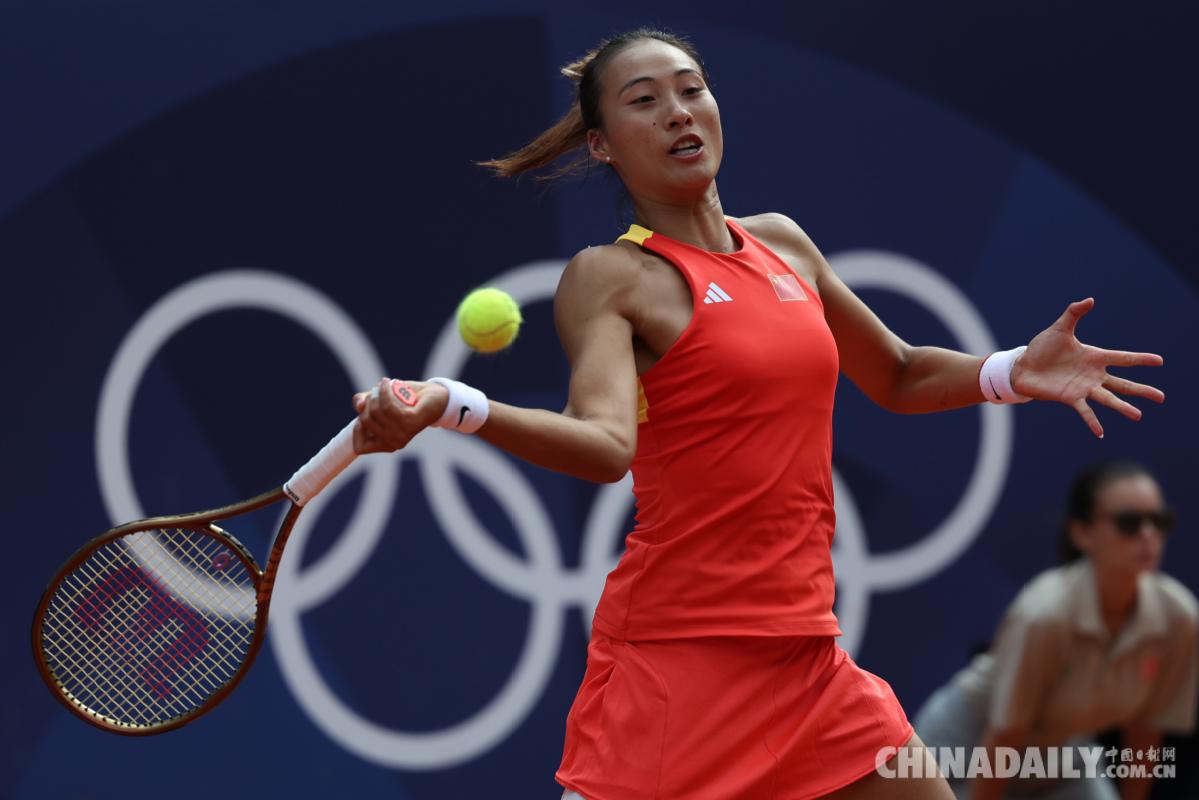
Professional push
The rapid progress of Zheng and her peers, including another young female talent Wang Xinyu, who teamed up with the country's top male player, Zhang Zhizhen, to claim a silver medal in the mixed doubles on Friday, stems from a tennis revolution launched by the success of Li Na.
Talent development, at the core of that revolution, has evolved profoundly in China. Today's players are exposed to the pro circuit earlier, managing their own careers with the support of international coaches, fitness trainers, physios and agents, unlike in the traditional State-run system, where a national-team program manages everything.
The result of this new, professional approach has been quite encouraging, especially on the women's side.
Spearheaded by Zheng, China currently has six players ranked in the top 100 on the women's tour. Only the United States, Russia and the Czech Republic have more players than China in the top 100, with 13, 12 and eight, respectively.
Organizers and promoters have also played their part in bringing more high-level tournaments to China to keep pace with the on-court breakthroughs.
From hosting only three professional tournaments before 2010, China now has seven WTA tournaments and five men's Association of Tennis Professionals events scheduled this year, and has become one of the busiest destinations on the professional tennis calendar.
The China Open, already the biggest men's and women's combined tournament in Asia, promises to be bigger and better this year, too, thanks to the growing domestic appetite for elite tennis.
In April, the tournament organizers announced the women's competition will be upgraded to a two-week format with 96 draws, up from 64 last year, placing Beijing alongside Indian Wells, Miami, Madrid and Rome as the fifth top-flight WTA1000 tournament.
On the men's side, the ATP500 tournament is expected to continue serving up high-quality players. Grand Slam champions Carlos Alcaraz of Spain, Daniil Medvedev of Russia and Italy's Jannik Sinner have all confirmed that they will return to Beijing this fall, after having featured in last year's star-studded men's draw.
The total prize money for the tournament, which runs from Sept 23 to Oct 6 at Beijing's National Tennis Center, will be increased to a record $13.14 million.
sunxiaochen@chinadaily.com.cn
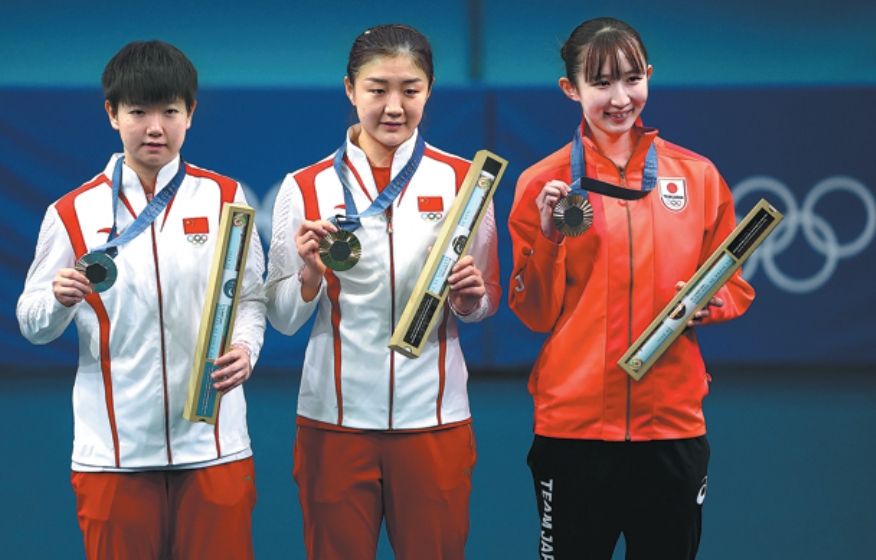
History repeated itself for China's defending table tennis champion Chen Meng, as she beat teammate Sun Yingsha 4-2 to win the women's singles gold medal at the Paris Olympics on Saturday, just as she did three years ago at the Tokyo Games.
This second triumph was even sweeter for fourth-ranked Chen, who called this win over world No 1 Sun a surprise, making her the third female table tennis player to win singles gold medals at two consecutive Olympics.
"This gold medal feels more valuable. In Tokyo, I was at the peak of my career, but, in the past few years, I've suffered a lot of losses and injuries," said Chen.
The 30-year-old added that she felt at a significant disadvantage before the match, given her losing track record against Sun, and attributed the win to her mindset.
Sun comfortably won the opening game 11-4. After Chen claimed the next two games 11-7 and 11-4, Sun, who had not lost a game at the Olympics until then, said her confidence started to shake. She leveled the match at 2-2 by taking the fourth game 11-9.
Chen remained calm under pressure, especially when she fell three points behind at the start of the sixth game, which she took 11-9 before finishing off the contest 11-6.
For Chen, the quick turnover in China's dominant team left her wondering if she will be back to defend her title.
"I don't know if this is going to be my last Olympics, so I want to cherish the opportunity as best as I can," she added.
The 23-year-old Sun, who was consoled by Chen with a hug after the loss, said she will fight for gold again in Los Angeles.
At the press conference, Sun also praised Japan's Hina Hayata, who earlier won the bronze medal match by beating South Korea's Shin Yu-bin 4-2 after overcoming an injury. It was a hard-fought victory which left her in tears.
Her performance secured Japan's second medal in the event, following Mima Ito's bronze in Tokyo three years ago.
Having injured her left wrist this week, Hayata could not even use a hair dryer and thought it was a mission impossible to play. After treatment, she adjusted her style to focus on using her forehand instead of backhand to avoid further pain.
"After this injury, I couldn't use my left hand at all. Being able to play and win a bronze medal despite that situation makes me feel incredibly grateful to everyone," said Hayata.
China's gold and silver sweep extended its dominance in women's singles, winning all 10 of the golds ever awarded in the event. Two Grand Slam — Olympics, World Championship and World Cup — champions, Zhang Yining and Ding Ning, were present in the stands to watch the matches on Saturday.
Reuters
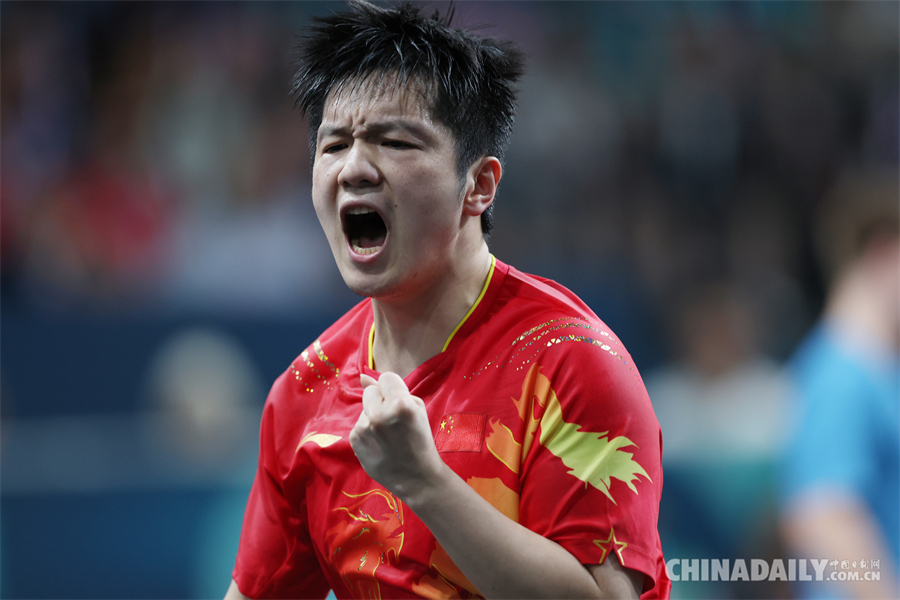
Complete, ruthless, aggressive and dominant — no single word quite describes China's Olympic and world champion paddler Fan Zhendong when he unleashes his fierce precision. He simply leaves his opponent, and the world, in awe.
The "baby-faced assassin", as he is known among his adoring fans for his cherubic features and deadly wrist, took the table tennis world by storm on Sunday, as he romped to a 49-minute 4-1 win over Sweden's Truls Moregard in the final of the men's singles to claim first Olympic gold medal of his career. It also means he has completed a prestigious "Grand Slam" by collecting titles at the World Championships, World Cup and, now, the Olympics.
It was eight years in the making, and countless challenges had to be overcome, not just from overseas opponents, but as many, if not more so from his world-class teammates, as he fought for supremacy in, arguably, the most intense "civil war" of any sport's national program. It has forged Fan's already steely will to the point of invincibility.

Fan's win on Sunday at the South Paris Arena — an almost "home court", packed by red-flag-waving Chinese fans — has redeemed the narrow defeat he suffered at the hands of his legendary teammate Ma Long in the singles final at Tokyo 2020, inspiring Fan to keep pushing to achieve a "double-slam" by 2028, as Ma did in 2021.
"It all came down to the hard work I put in every day. While there are athletes with innate talent, who can win easily anytime, anywhere, I hope to keep sharpening my craft and continue fighting for more glory, together with my team," Fan said at the post-final news conference.
Fan's final encounter with Moregard, who stunned China's world No 1 Wang Chuqin in the opening round, was the latest installment of a decades-long international rivalry between China and Sweden, underlined by the respective team coaches — China's three-time Olympian Wang Hao and Swedish legend Jorgen Persson, who have fought many classic matches against each other throughout their playing careers.

"Each and every team has its own prime era, and the Swedish program was definitely one of our biggest rivals," said 27-year-old Fan, who has bagged a total nine world championships gold medals in singles, doubles and team since his debut in 2014.
"Now with strong and young competitors like Moregard emerging, I believe the rivalry will continue, and we need to push ourselves to stay ahead."
After beating Moregard 4-1 with relative ease, Fan performed for the roaring crowd in Paris, tucking both hands beneath his armpits to emulate French soccer star Kylian Mbappe's signature goal celebration.
A die-hard fan of Spanish La Liga giant Real Madrid, Fan also impersonated former Madrid superstar Cristiano Ronaldo, performing the iconic "siu" celebration to celebrate his 4-0 semifinal win against local favorite Felix Lebrun — a fun gesture that has won over fans in Europe.
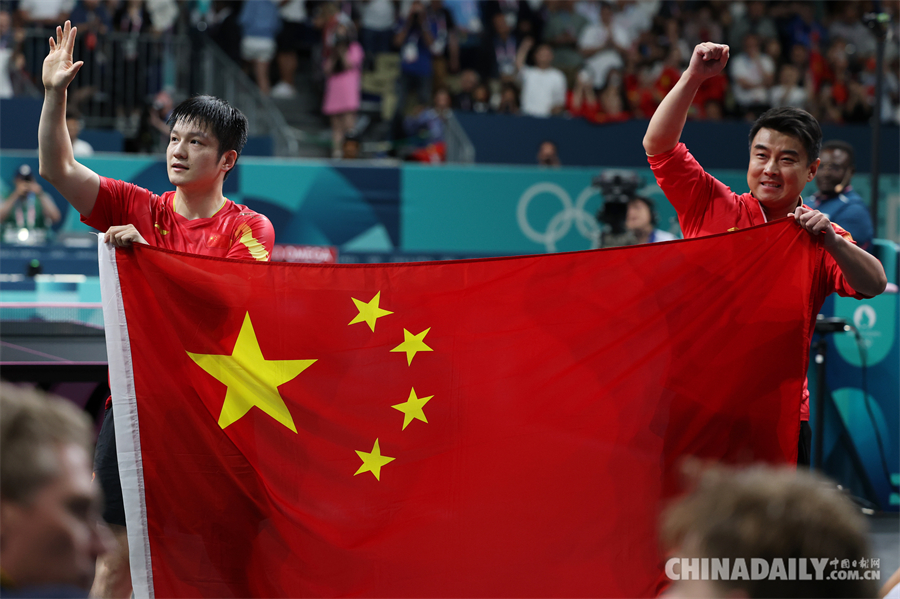
A super Swiftie
As aggressively competitive as he is at the table, Fan comes across as any average young man, following European soccer as his hobby, and enjoying the latest music trends, especially the catchy songs of pop megastar Taylor Swift.
By posting his appreciation for Swift's music regularly on his social media account Weibo, where he has garnered over 3.2 million followers, Fan has captivated not only table tennis enthusiasts, but also a legion of "Swifties", the American artist's devoted followers.
After Fan outplayed Lebrun to advance to the men's singles final on Friday, social media users began superimposing Fan's face on Taylor Swift posters and stickers to rally support for the table tennis standout.
Fan, a self-proclaimed Swiftie himself, has openly expressed his admiration for the iconic musician.

"Music is universal. Great musicians like Taylor bring us healing power and confidence," he said.
The intersection of China's pingpong and global pop culture perhaps hit its high note when Fan edged Japan's Harimoto Tomokazu 4-3 in a gruelling, see-sawing quarterfinal battle on Aug 1 — a date loaded with Swiftie superstition due to the star's hit song "August".
However, due to the demands and expectation of his fans, the sharing of his personal life on social media can sometimes end up not being much fun at all.
In March, Fan posted footage from Swift's Singapore leg of her Eras tour on his Weibo account just days before a World Table Tennis event, where he was eventually upset by 18-year-old compatriot Lin Shidong in the round of 32.

Some overzealous fans soon tried to link his defeat to attending the concert and enjoying himself, believing it distracted him from his preparations for the tournament.
His post of the concert was soon flooded by negative comments, criticizing his lack of commitment.
As a major sports celebrity in China, Fan has called on his followers to "be rational and boycott idol culture", after an incident which saw an unidentified fan break into his Beijing hotel room and steal his underwear.
"I am an athlete, cultivated by my country. It's my duty to fight for the country and, for more than 10 years, I've never wavered from this duty," Fan said.
"In my free time, I am just an ordinary young man. I have normal hobbies and I have my social network. I will continue to be true to my heart under the premise of following the law and the rules."
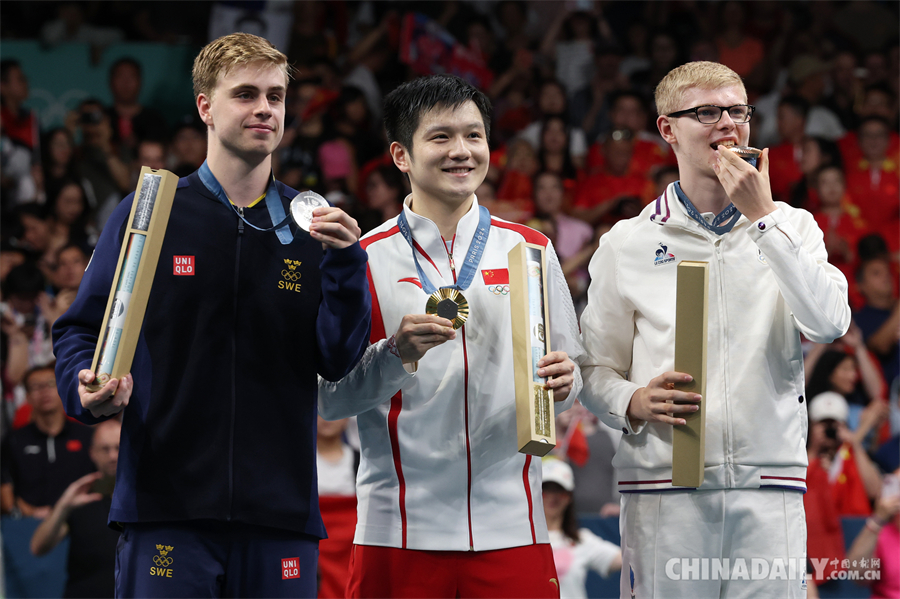
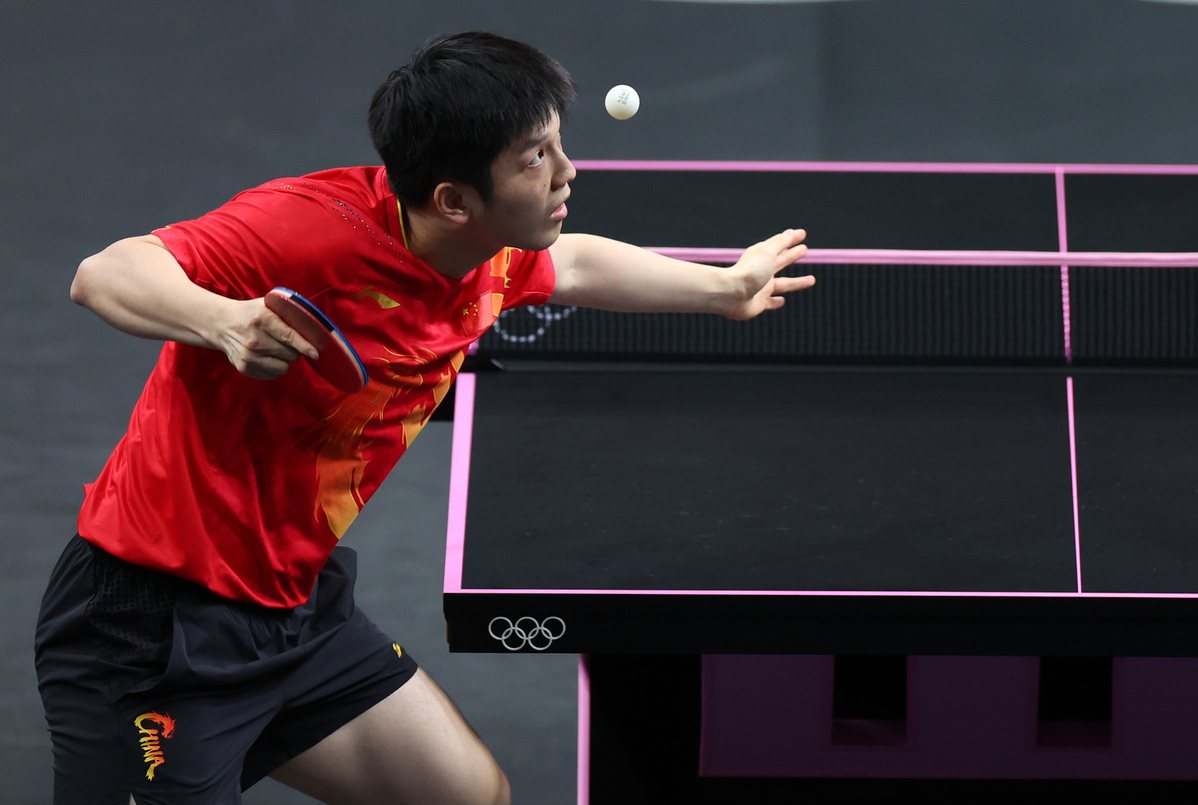
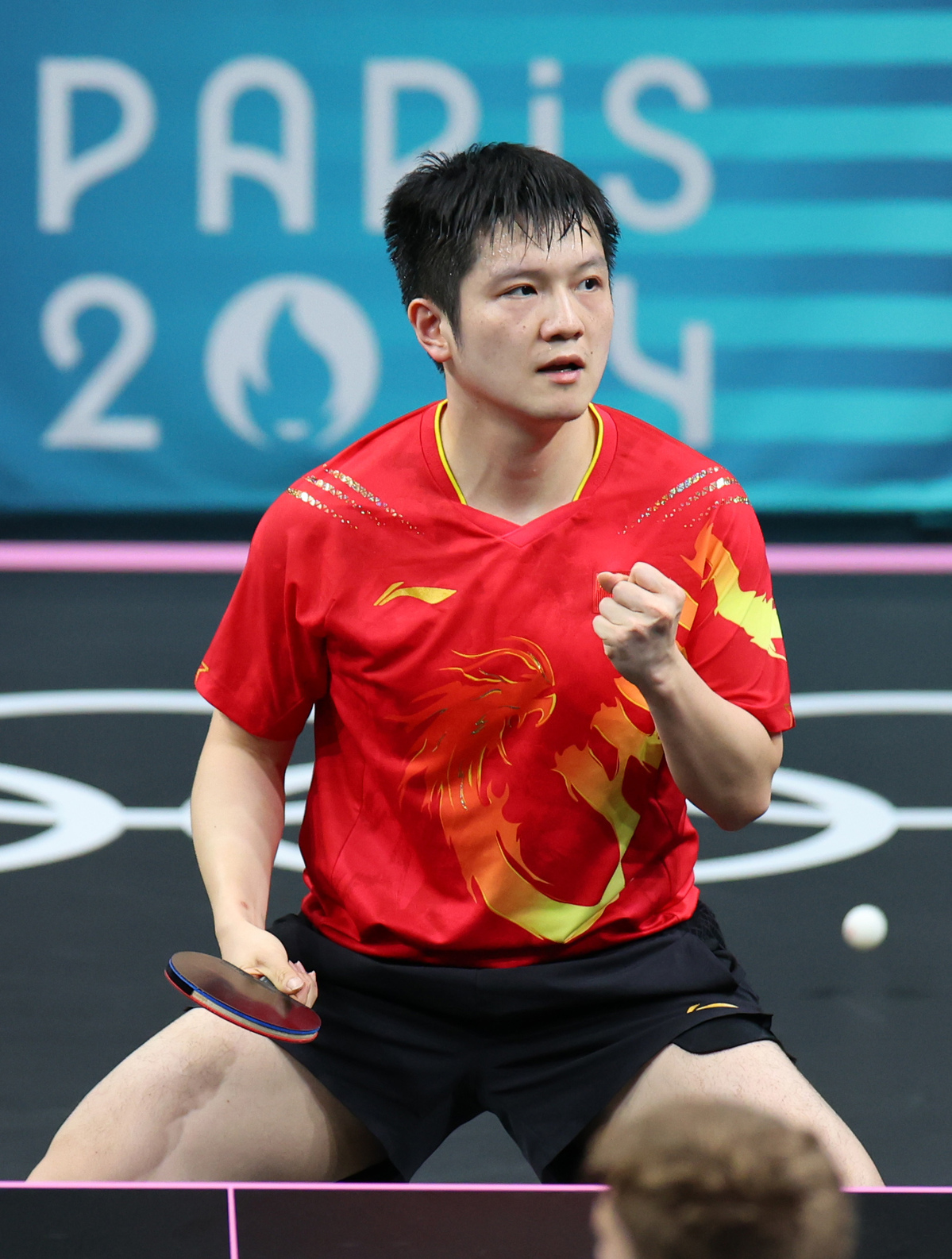
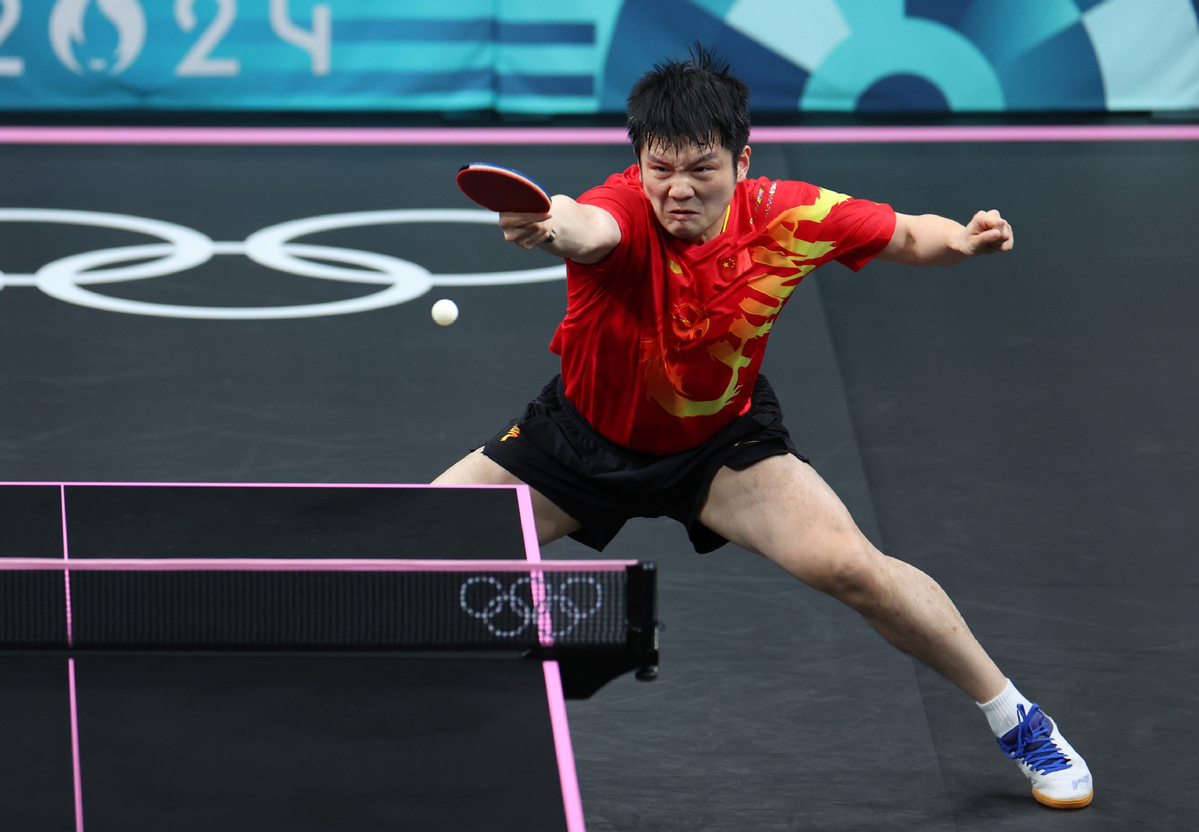
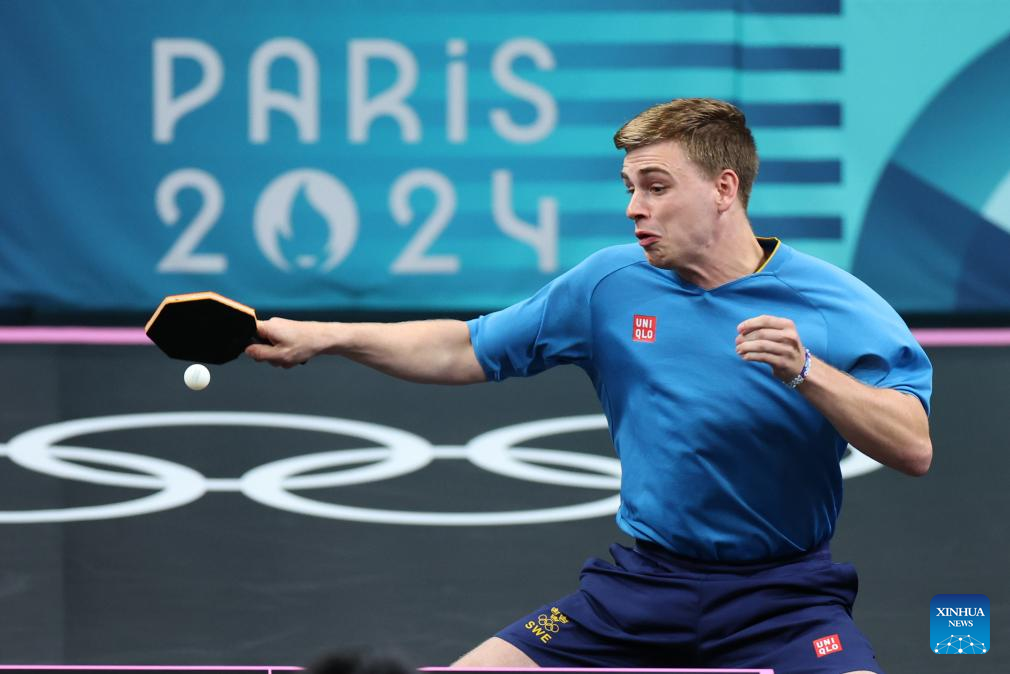
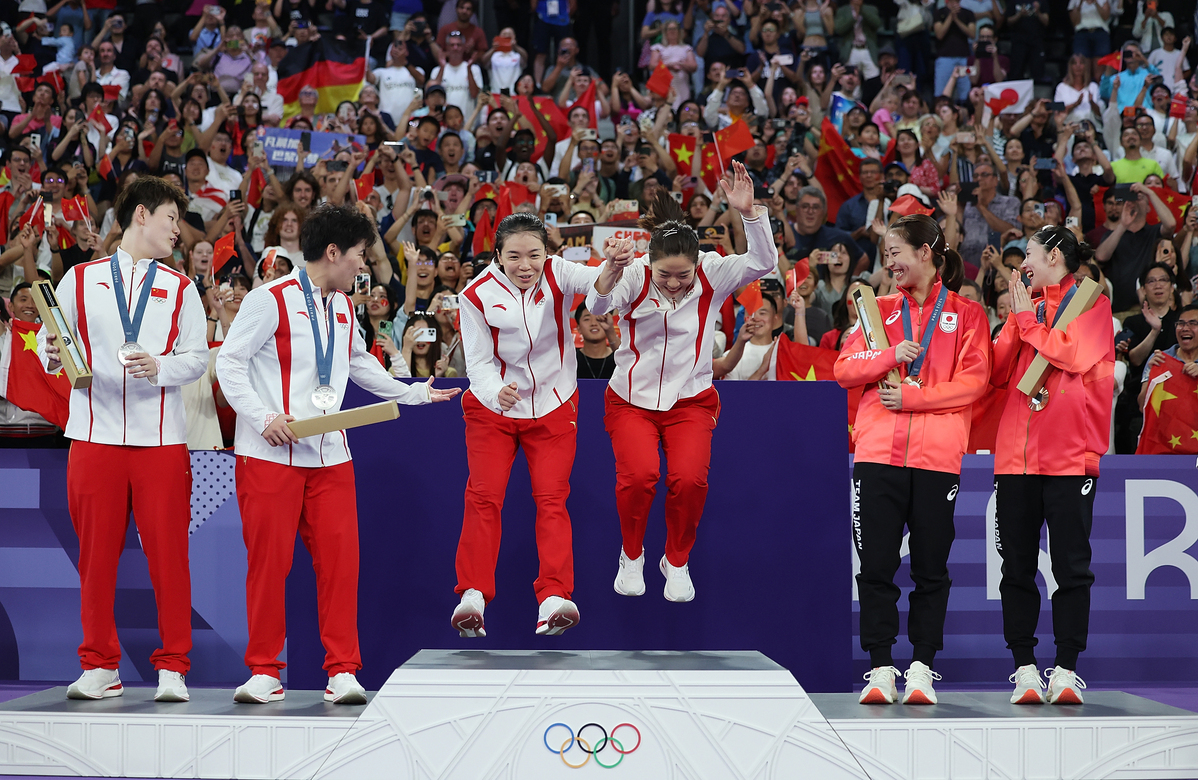
China's ambitious gymnastics team has finally delivered on the big stage at the Paris Olympics, having suffered consecutive near misses in earlier events, with a one-two finish in the men's rings final on Sunday.
With a consistent, high-quality execution of his dazzling routines, China's defending champion Liu Yang fended off a strong field, including teammate Zou Jingyuan and Eleftherios Petrounias of Greece, to finish first in the men's rings final and retain the gold in an event that tests strength and balance to the extreme.
Liu said after winning the first gold medal for the Chinese gymnastics squad that he was proud to be the one who got the monkey off the team's back.
"I feel there were still some flaws in today's routine. As a perfectionist, it wasn't perfect enough for me. But I'm very happy to have won a gold medal for China," said Liu, who dominated the final with 15.300 points.
"I'm both happy and a bit regretful. I'm thrilled to defend my title on the rings, but it's disappointing that we didn't win the gold medal in the team event."
Last week at Bercy Arena in Paris, Team China was beaten by Japan in the last minute in the men's team final after two gymnasts, veteran Xiao Ruoteng and youngster Su Weide, both landed with errors in their routines on the horizontal bar, squandering China's early lead.
Liu is now the third man to win multiple Olympic titles in rings, joining Albert Azaryan of the former Soviet Union and Akinori Nakayama of Japan.
Zou came in second with 15.233 points, while Petrounias completed the podium with 15.100. Samir Ait Said of France finished fourth, eight years after breaking a leg on the vault at the Rio Olympics. Said, who has committed to trying to make it to Los Angeles 2028, roared after his dismount in front of a highly partisan crowd inside Bercy Arena.
Meanwhile, the all-conquering Chinese table tennis team stayed on course for a clean sweep of all five gold medals up for grabs in Paris, after nine-time world champion Fan Zhendong overcame a first-game scare to beat Sweden's 22-year-old Truls Moregard 4-1 to win his first men's singles Olympic gold medal.
The victory also helped him complete a "grand slam" in table tennis that refers to a player's collection of all the three major titles: world championship, World Cup and Olympic gold.
It was also the first time since Athens 2004 that the men's singles final at an Olympics featured a non-Chinese competitor, with the finals at Beijing 2008, London 2012, Rio 2016 and Tokyo 2020 all seeing battles between two Chinese.
"Without the disappointment and growth from Tokyo 2020, I probably wouldn't be here today," Fan said of his comeback from a narrow defeat by veteran Ma Long in the final at the Tokyo Olympics.
"Every failure or challenge helps you grow. The prerequisite is that you have the courage to face your failure," he said.
"For the preparation for these Games, I didn't focus too much on the final outcome. I just focused on making the best out of my everyday routines. As long as you work hard and stay concentrated on your target, the result will take care of itself," said Fan, a 27-year-old native of Guangdong province.

Chinese tennis phenom Zheng Qinwen, whose unprecedented victory on Saturday at Roland Garros won her the coveted title of the first Olympic singles champion in Asia, is primed to fill the big shoes of her legendary predecessors and strongly represent China in the global sporting community.
The 21-year-old established her spectacular career milestone by beating Croatia's Donna Vekic in straight sets at the renowned red-clay venue in Paris, and gave China its second Olympic tennis gold after the women's doubles title won by Li Ting and Sun Tiantian at the 2004 Athens Games.
Saturday's historic moment propelled Zheng into the pantheon of Chinese sporting greats, such as former NBA All-Star Yao Ming, 110m hurdles champion Liu Xiang and two-time Grand Slam winner Li Na. She is now representing the confident and vibrant image of Chinese youth on the international stage, thanks to her impressive foray into a traditionally Western-dominated professional sport.
Zheng, who hails from Hubei province, said she is honored to join all the history-makers, but will stay sure-footed and laser-focused on chasing more consistent breakthroughs.
"To be honest, I always dreamed of one day joining the likes of Yao, Liu and Li, and to be as successful and influential as they were as athletes," Zheng told China Daily on Sunday at the Nike Athlete House, next to the Olympic Village.
"I've been working so hard toward that goal, and (have) finally proved that I have what it takes to become the new leader of Chinese tennis. … I feel so privileged and honored," she said.
"Yet I know where I am, having also pulled through so many defeats, and where my remaining goals are. I have plenty more dreams to realize, such as Grand Slam titles, so I won't stop pushing," she added.
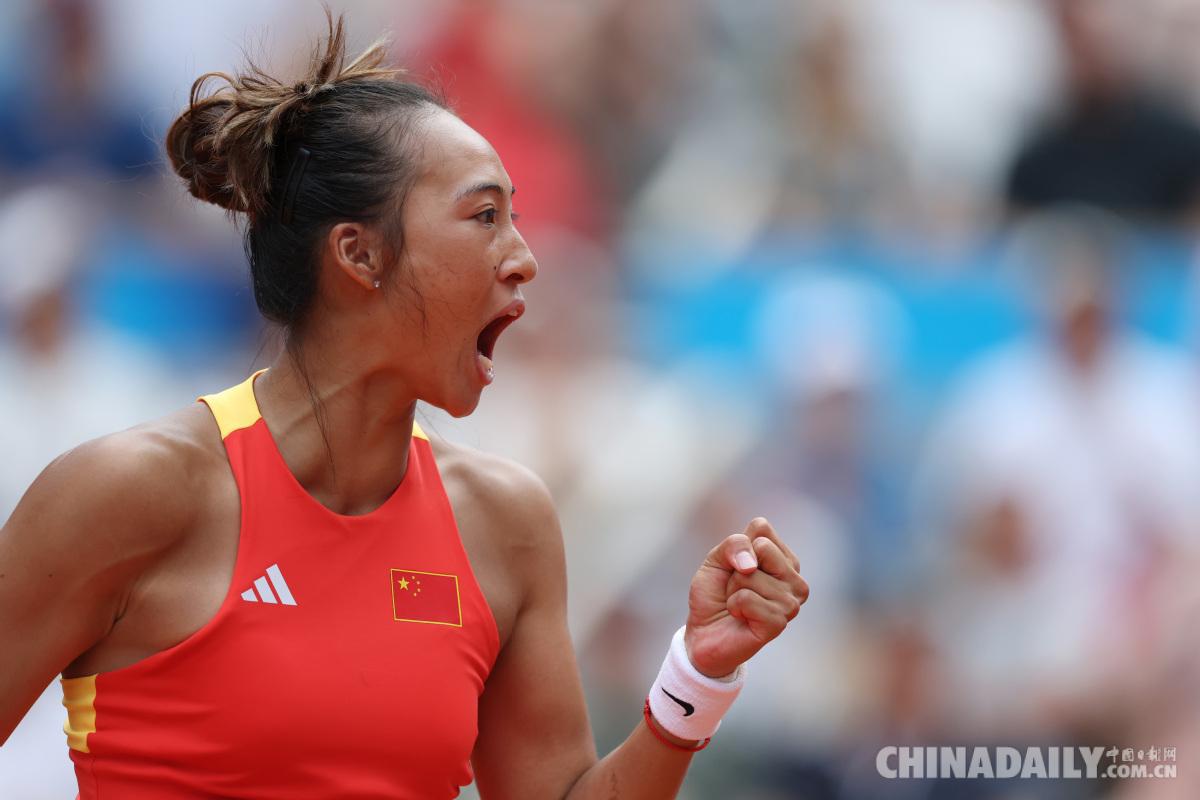
As world No 7, Zheng is currently China's highest-ranked female tennis player. Her Olympic victory has turned heads on professional circuits, with the International Tennis Federation, the Women's Tennis Association and all four Grand Slam tournaments sending her congratulatory messages.
The official Chinese account of the French Open on Sina Weibo said: "There is a golden dream and a nation's obsession. Eventually, a daughter of that nation, Zheng, unraveled it at Court Philippe-Chatrier."
Inspired by her aggressive attacking style on court and some similarity with the pronunciation of her given name, Zheng's legion of international fans called her "Queen Wen" at previous tournaments.
Zheng said that after her Olympic victory, she is confident she will live up to their expectations. "Before this, I would have been modest and said, 'Oh, don't call me that'. But now, I understand its significance and have embraced it," she said.
The tennis ace, who boasts three singles titles on the professional WTA Tour, a runner-up finish at the 2024 Australian Open and a singles win at last year's Asian Games, added, "I've fought on the court for a long time and truly feel I've pushed my own limits, so the title 'Queen Wen' is well-deserved."
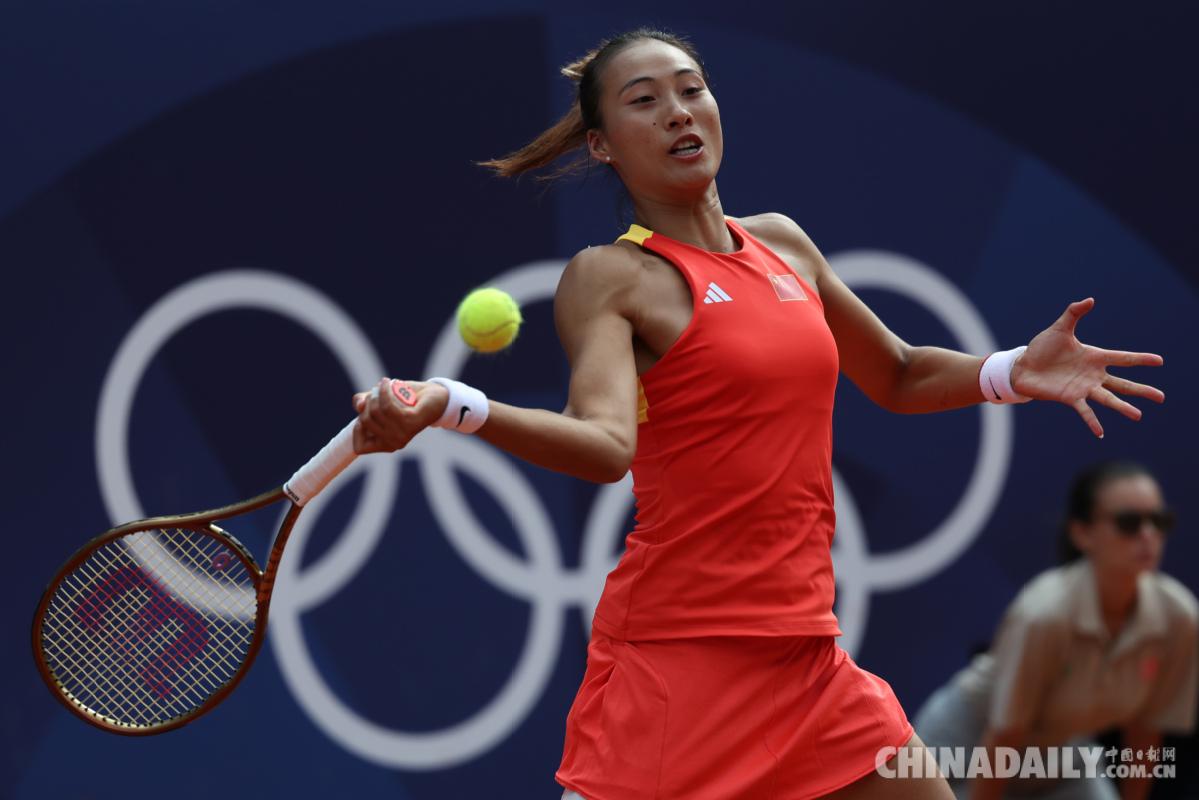
Following in the footsteps of Li, she is set to become another commercially successful female player from China, with her convincing athletic records and charismatic personality drawing an increasing number of domestic and international brands as her sponsors.
On the Forbes' 2023 list of highest-paid female athletes worldwide, Zheng ranked 15th with $1.7 million in prize money and $5.5 million in endorsement income, making her the first Chinese tennis player featured on the list since Li.
Before the Paris Games, Zheng also secured endorsements from brands such as Rolex, Nike and Alipay, with sports marketing experts predicting an exponential rise in her market value following her Olympic success.
Zhang Zizhu, a Beijing-based marketing and branding agent, told the 21st Century Business Herald: "Tennis, as a professional sport, traditionally produces some of the world's highest-paid stars, thanks to the complete sponsoring and marketing systems promoted by sports agencies. Zheng's rise has tapped into that huge potential of the sport in the Chinese market".
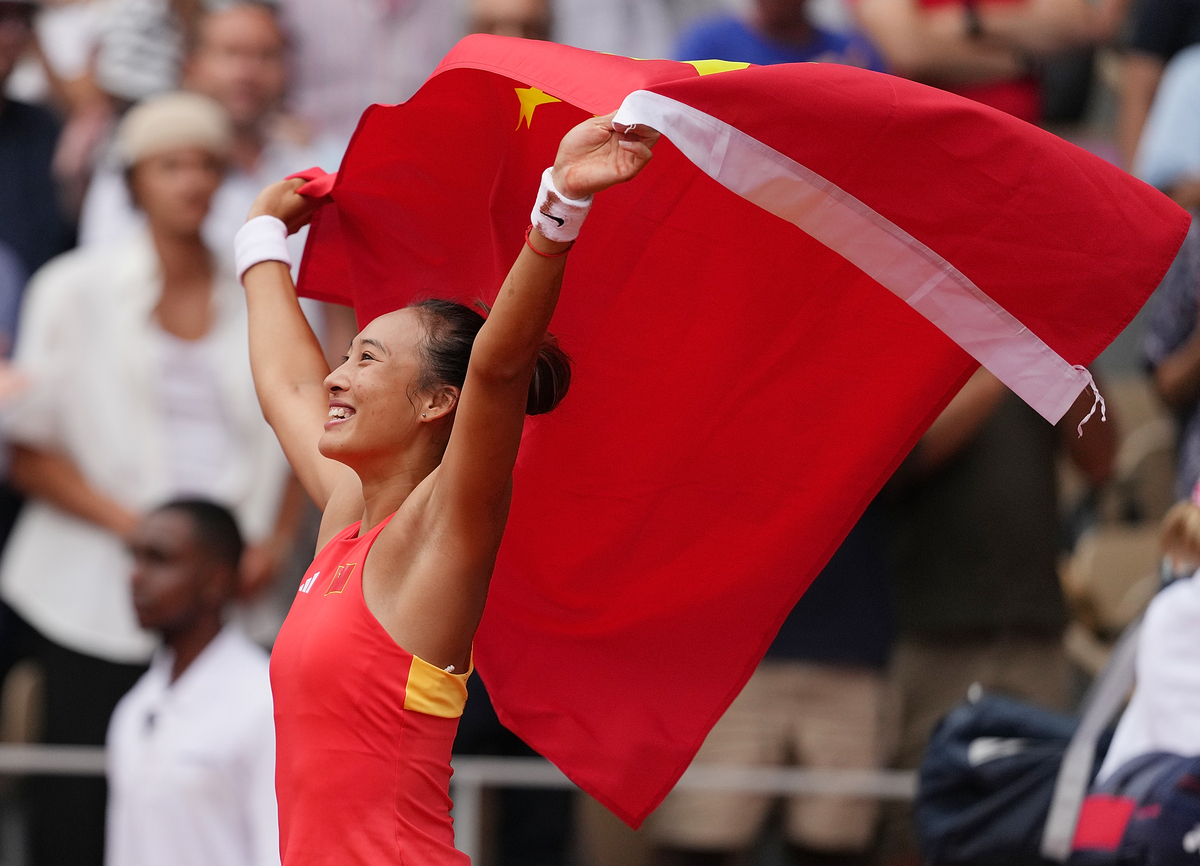
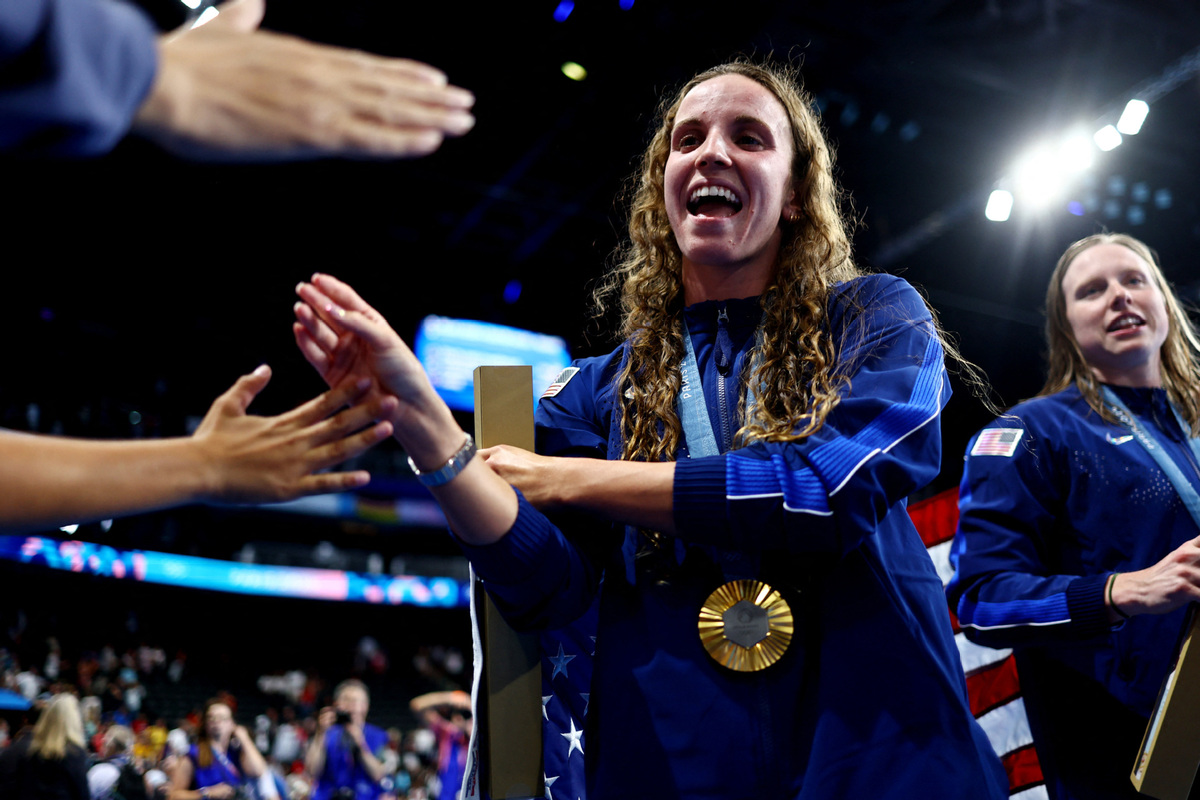
PARIS -- The United States set a new world record as they claimed their eighth swimming gold medal of the Paris Games by winning the women's 4x100m medley relay final on Sunday.
The US team of Regan Smith, Lilly King, Gretchen Walsh and Torri Huske clocked three minutes 49.63 seconds, breaking their own previous record of 3:50.40 set in 2019.
Australia's Kaylee McKeown, Jenna Strauch, Emma McKeon and Mollie O'Callaghan took silver in 3:53.11 while China's Wan Letian, Tang Qianting, Zhang Yufei and Yang Junxuan claimed bronze in 3:53.23.
"This is not a victory for myself, but a fight for China's glory," Zheng Qinwen, 21, told reporters after her historical win on Saturday to claim the women's tennis singles gold at the Paris 2024. "I fought my best, and it is unique for me and unparalleled."
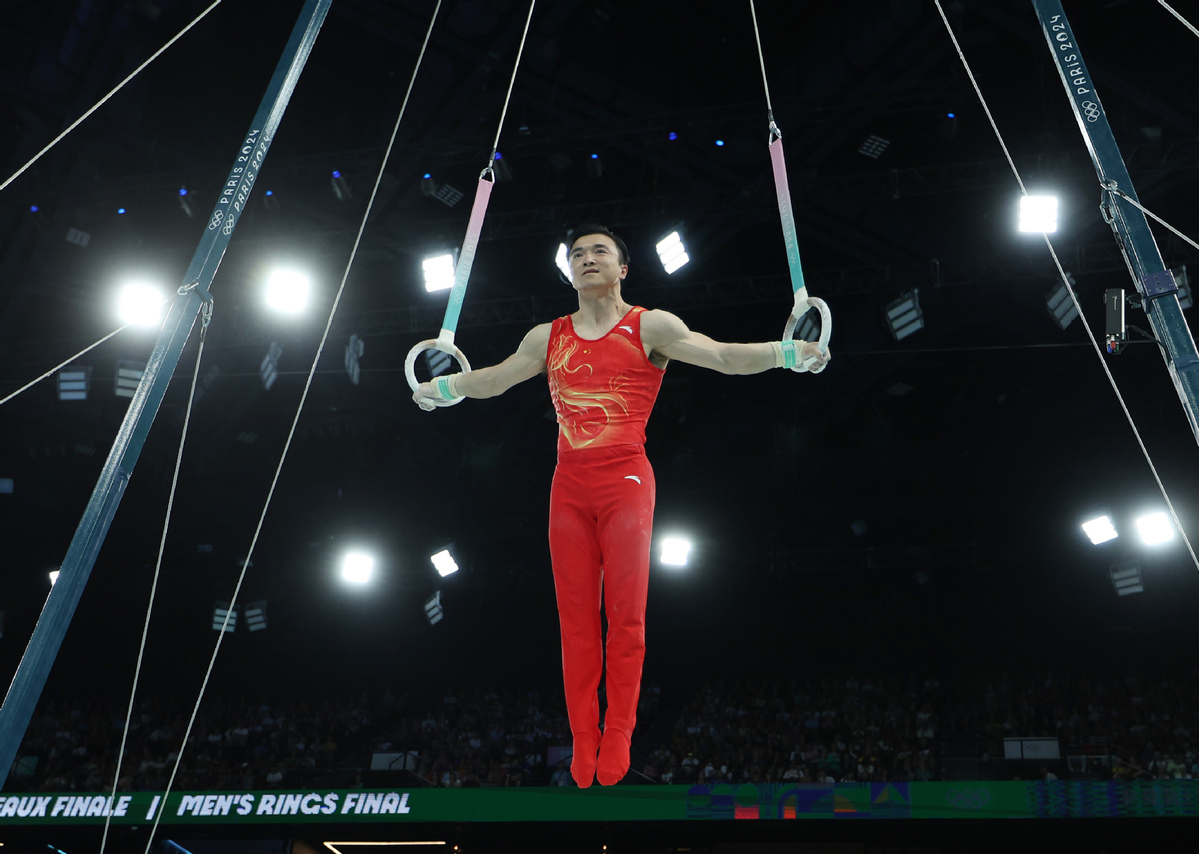
PARIS -- Liu Yang secured China's first gymnastics gold medal of the Paris Olympics on Sunday when he led all the way to win the men's rings event.
The defending champion scored 15.300 points to lead a 1-2 finish for China in the event. His compatriot Zou Jingyuan took silver with 15.233, ahead of Tokyo 2020 bronze medalist Eleftherios Petrounias of Greece, who posted 15.100.
Samir Ait Said, the only male athlete representing host nation France in artistic gymnastics, finished fourth with 15.000.
